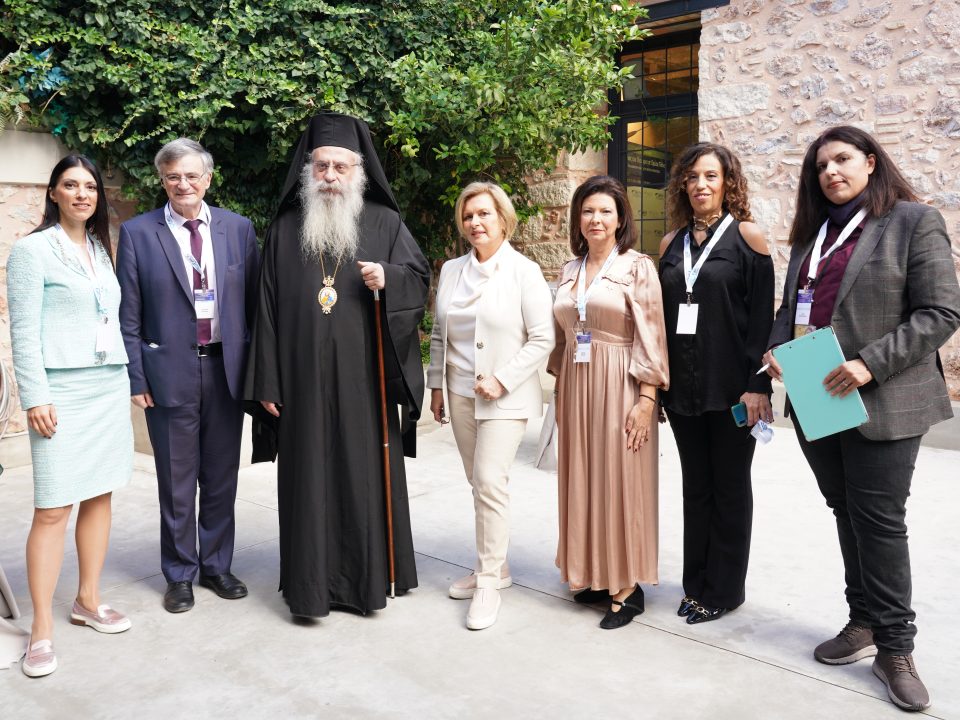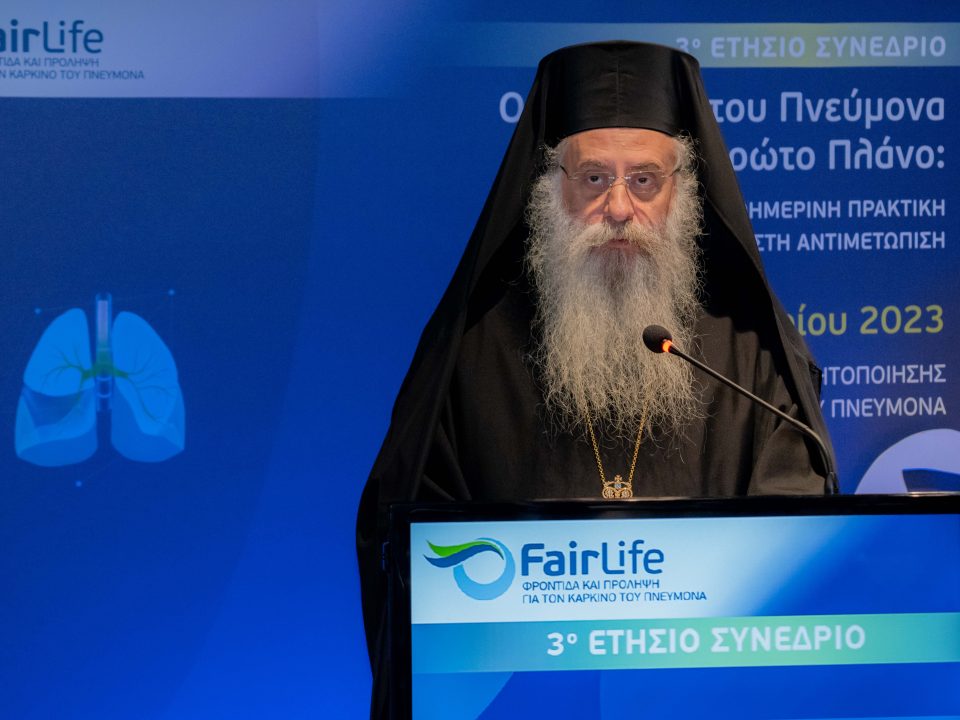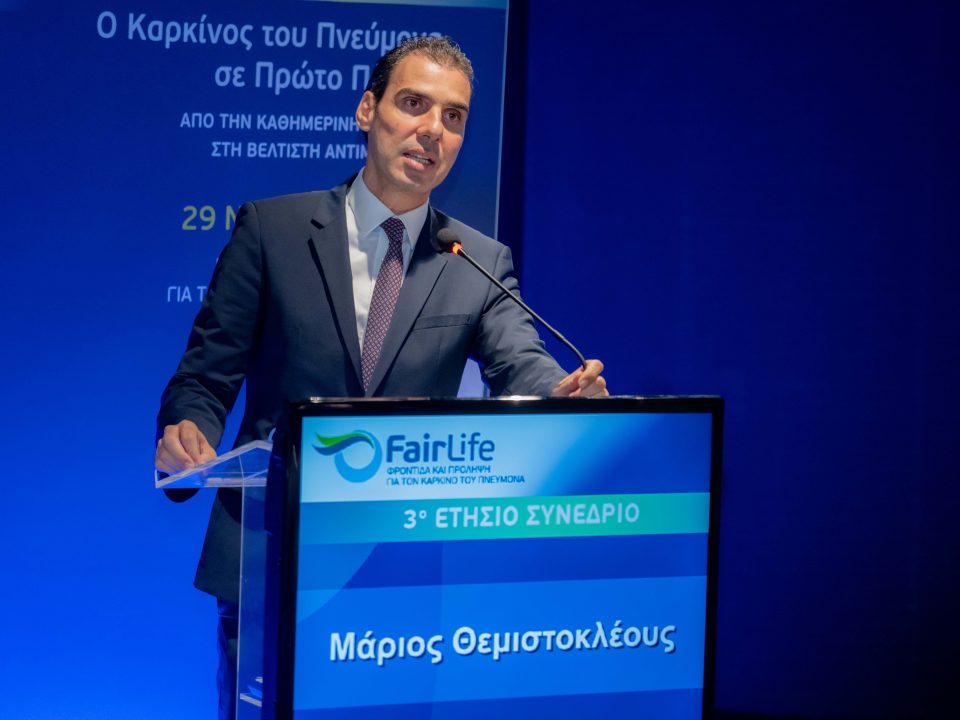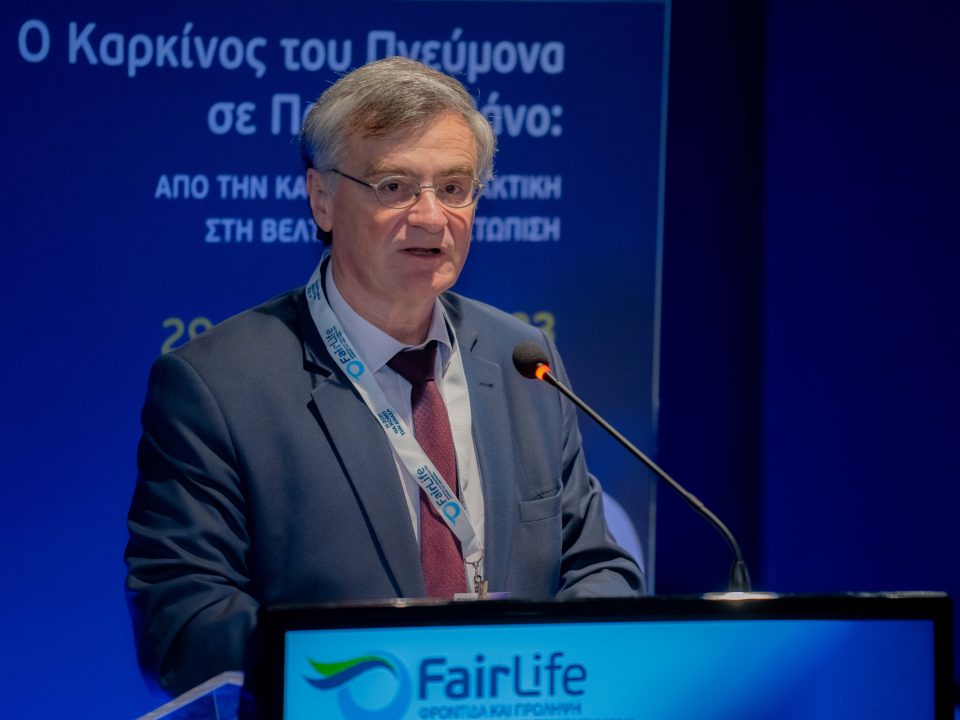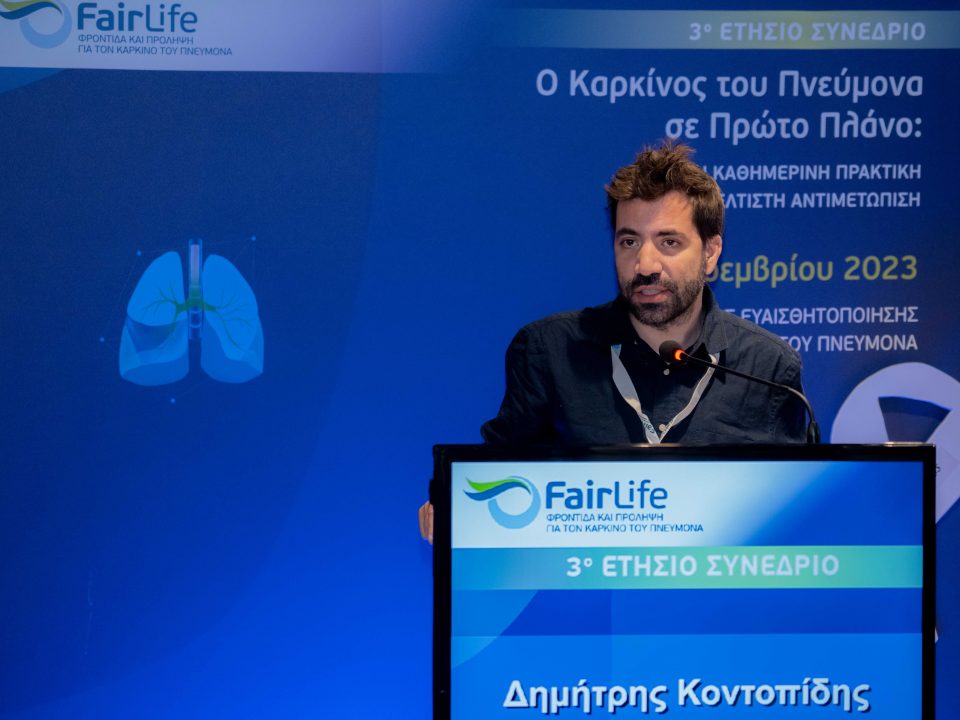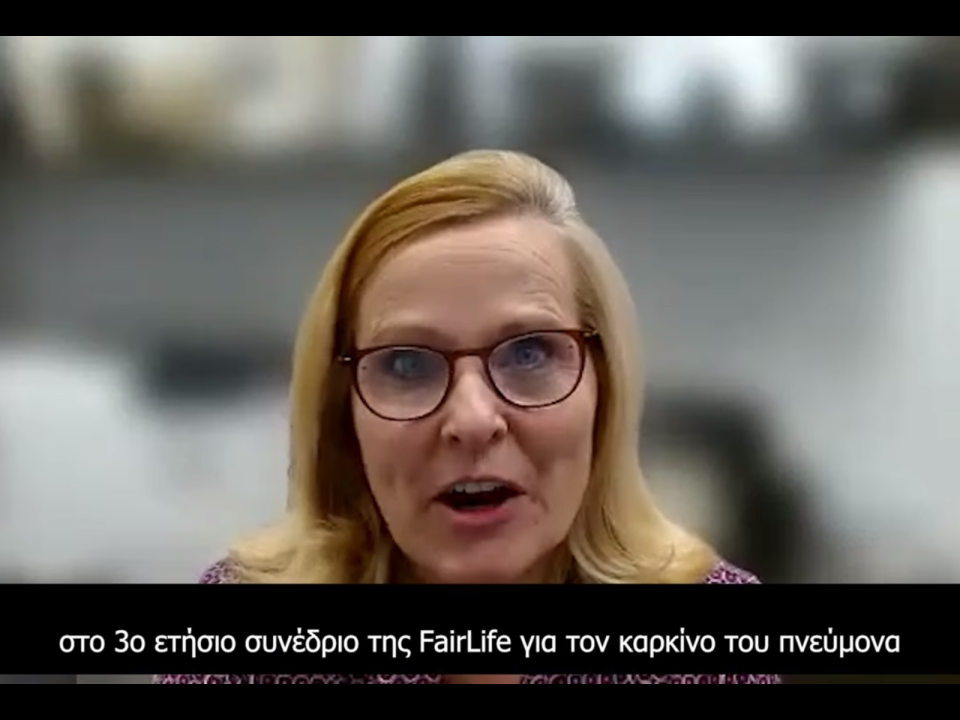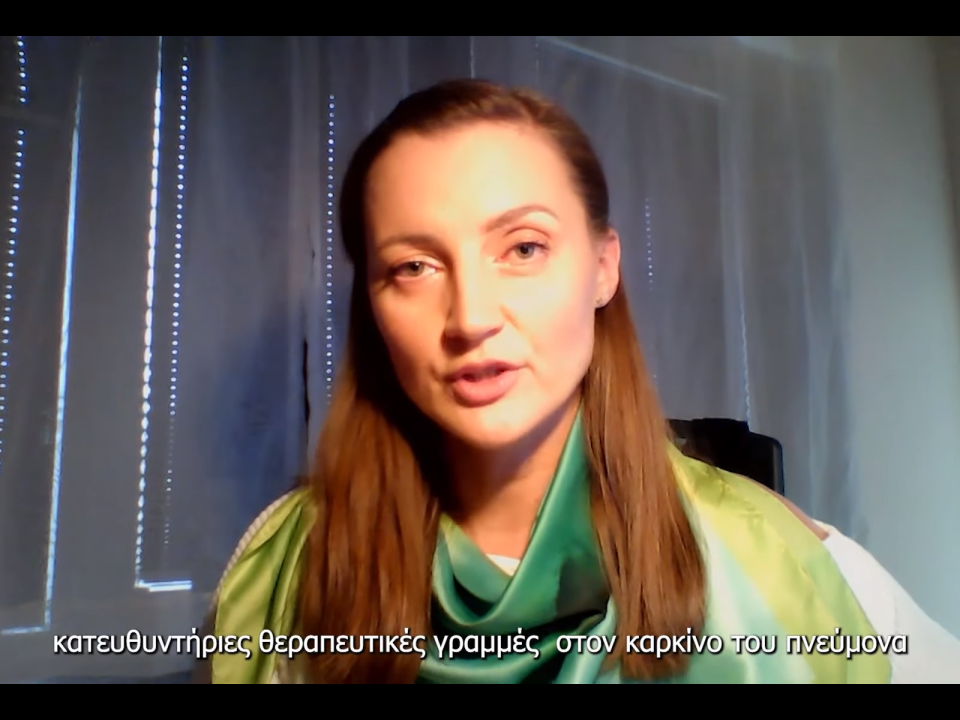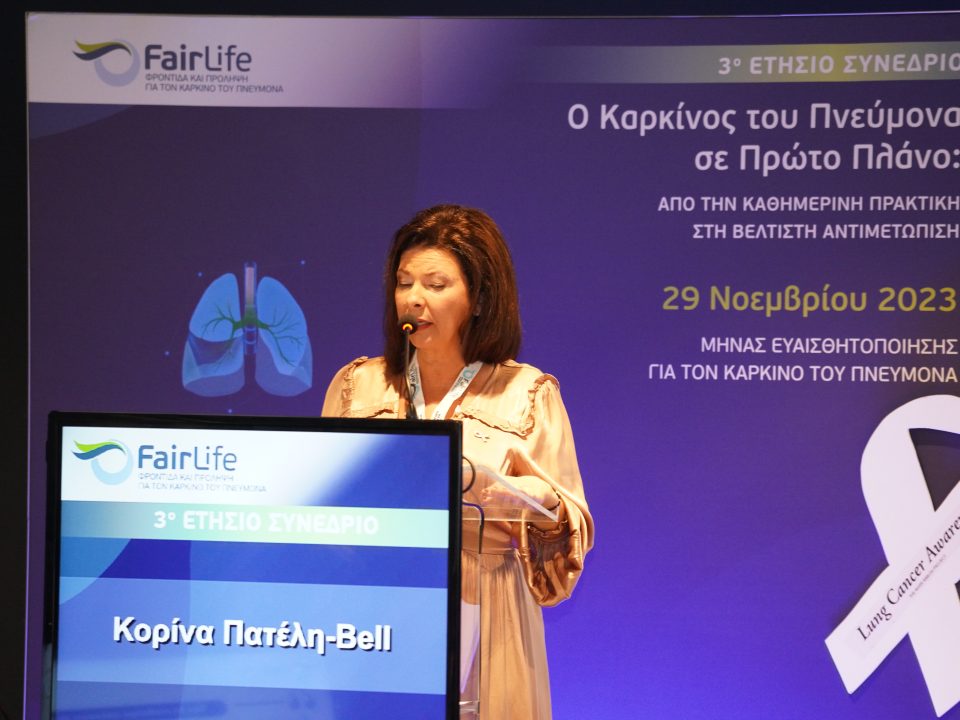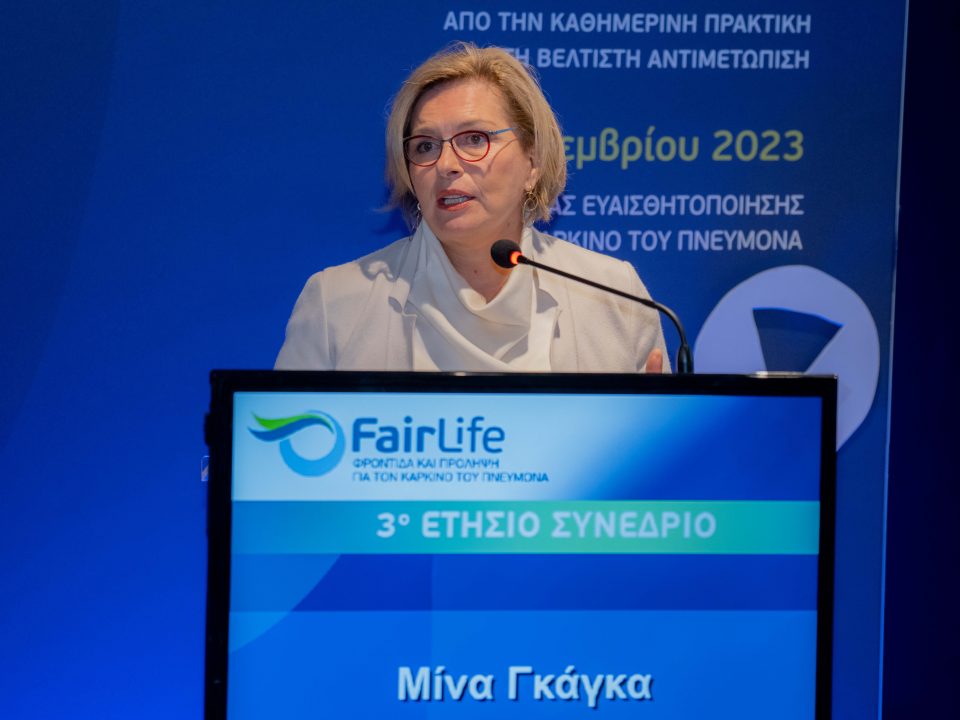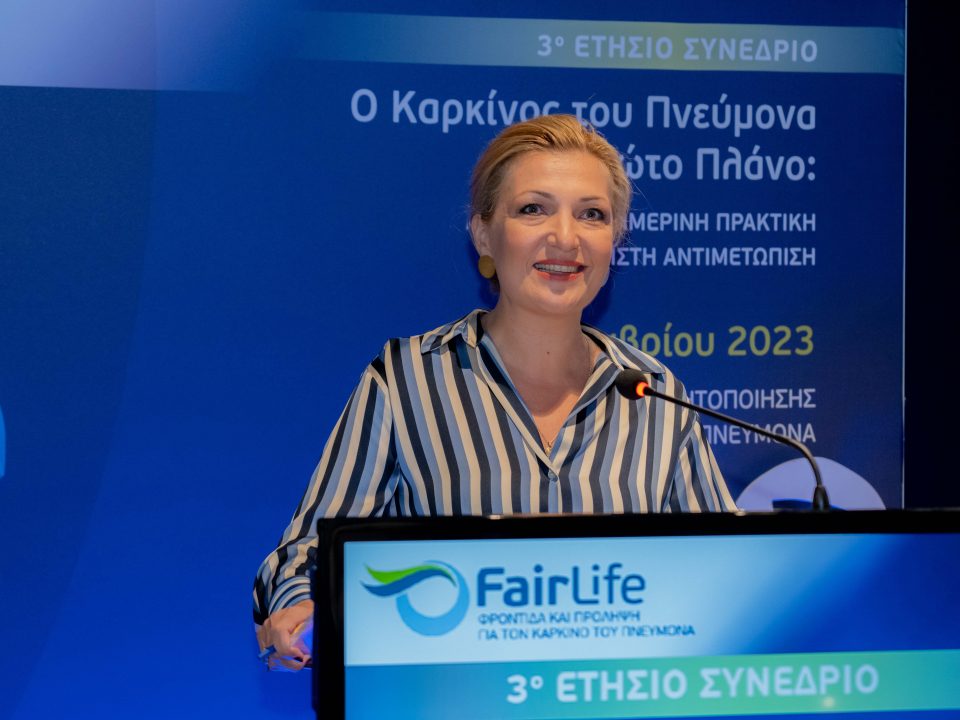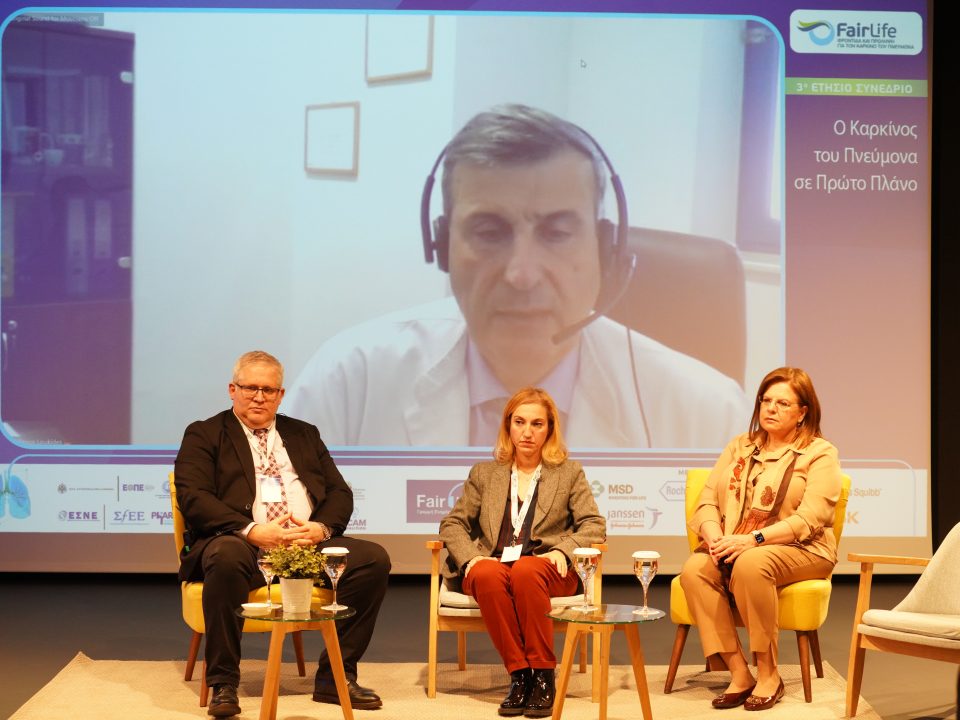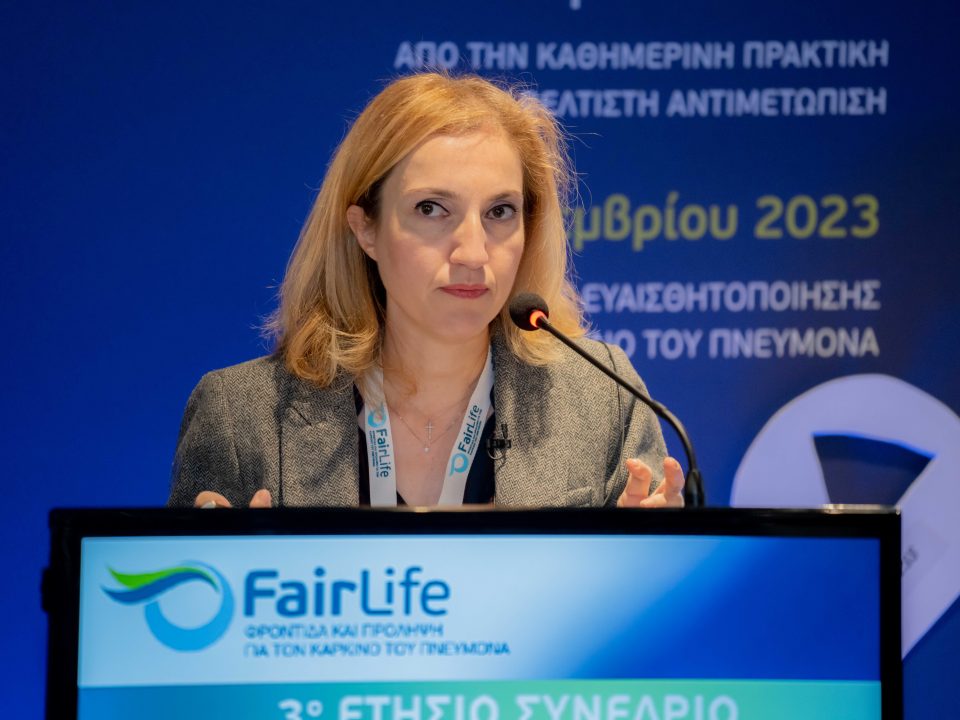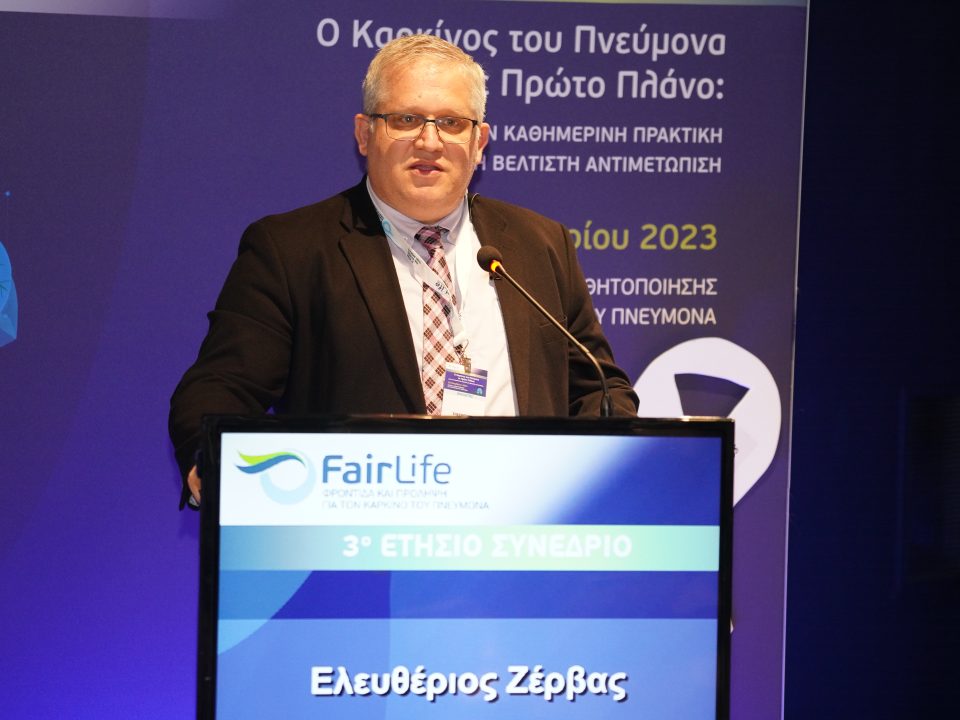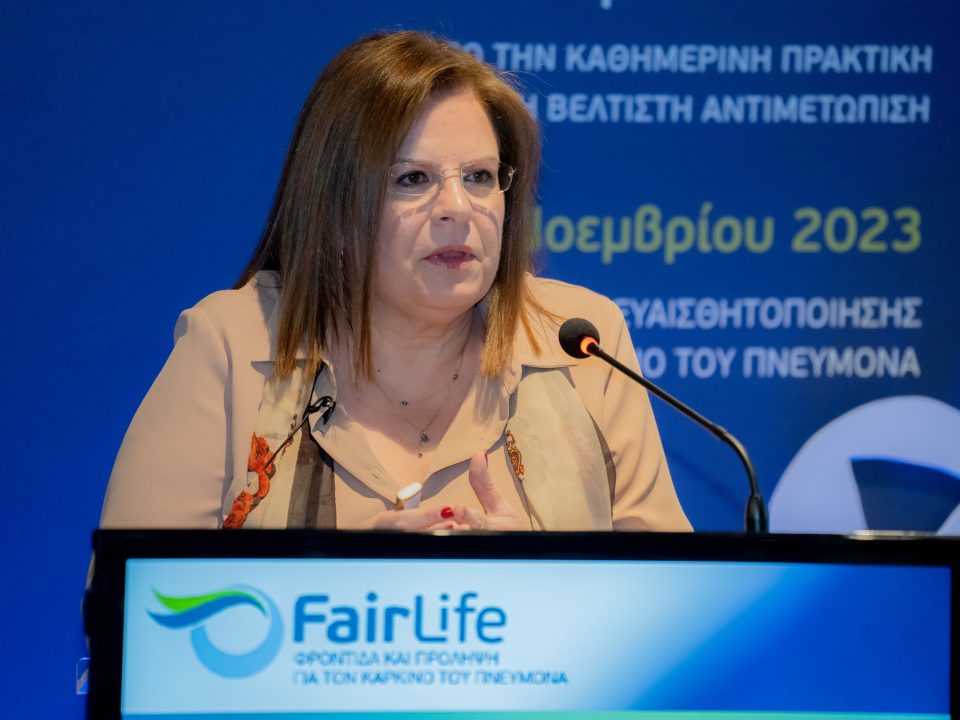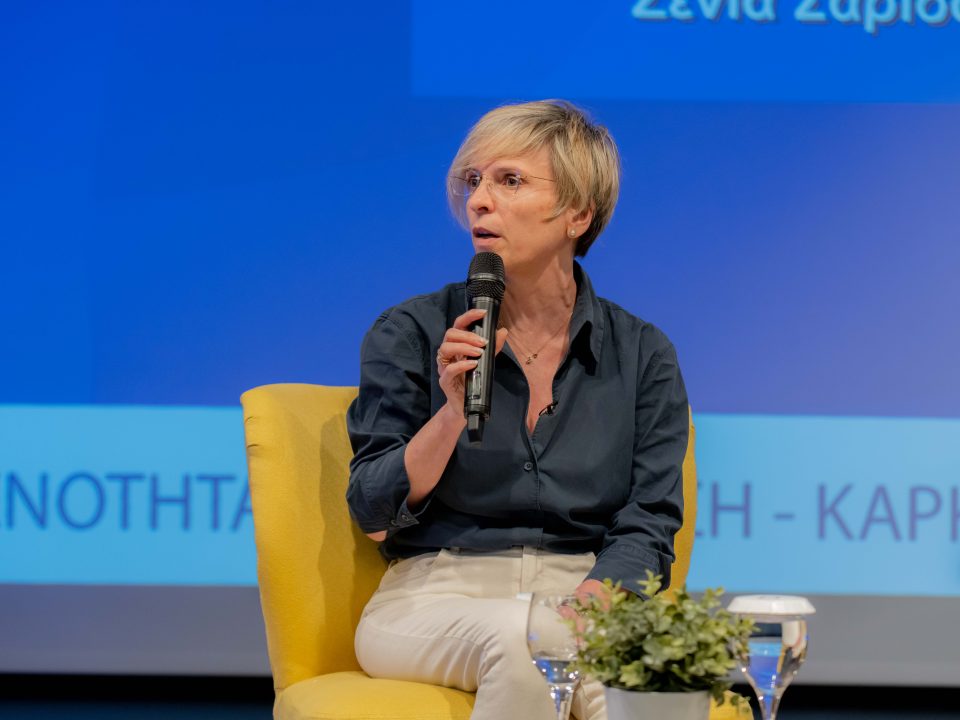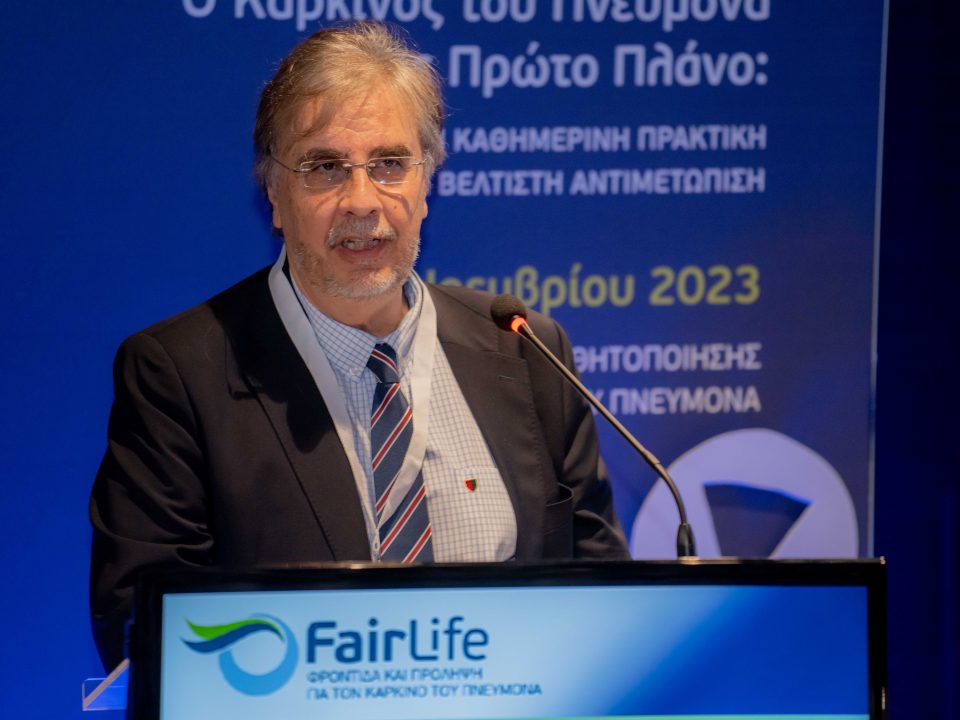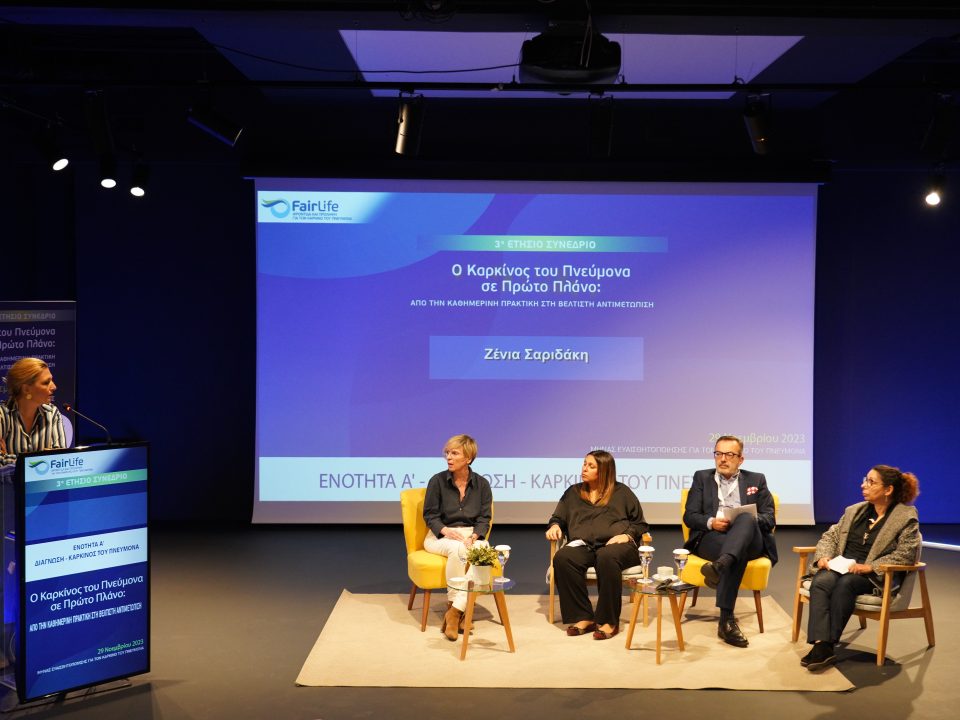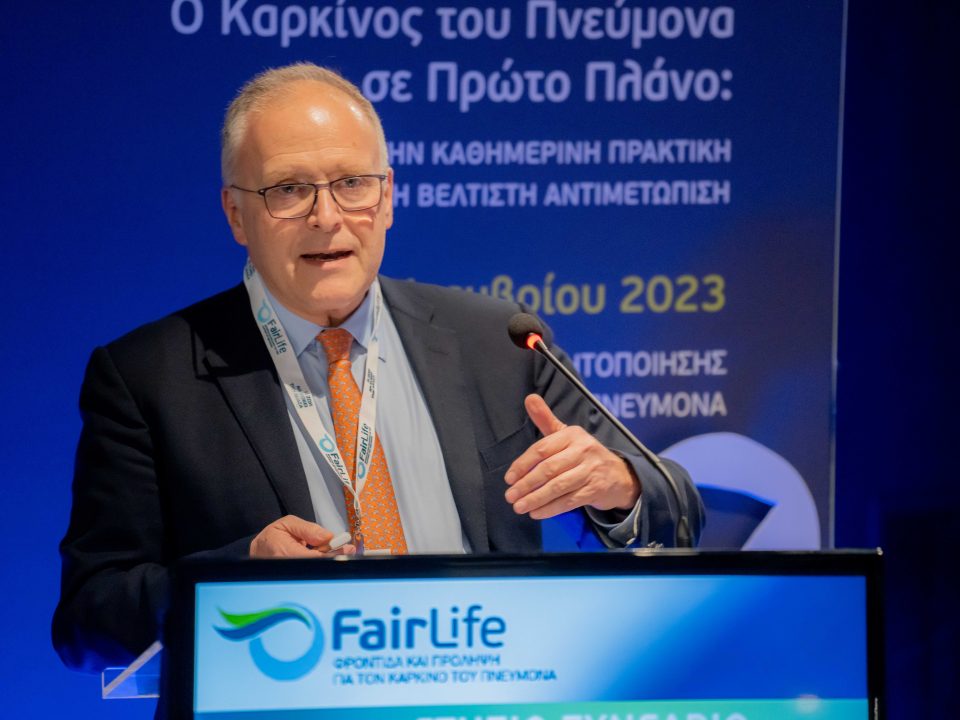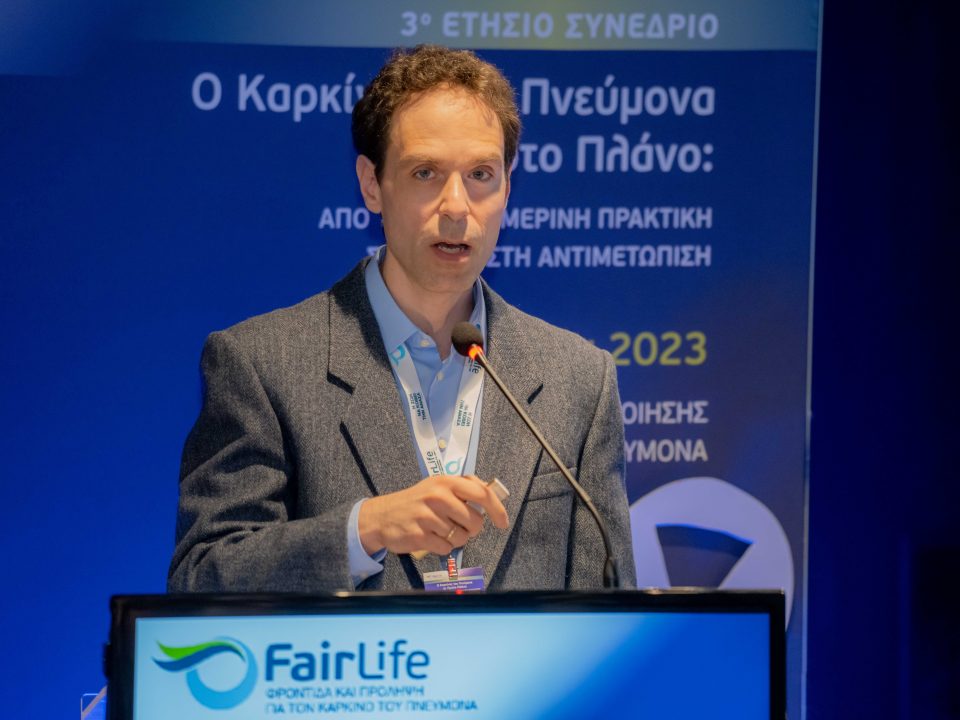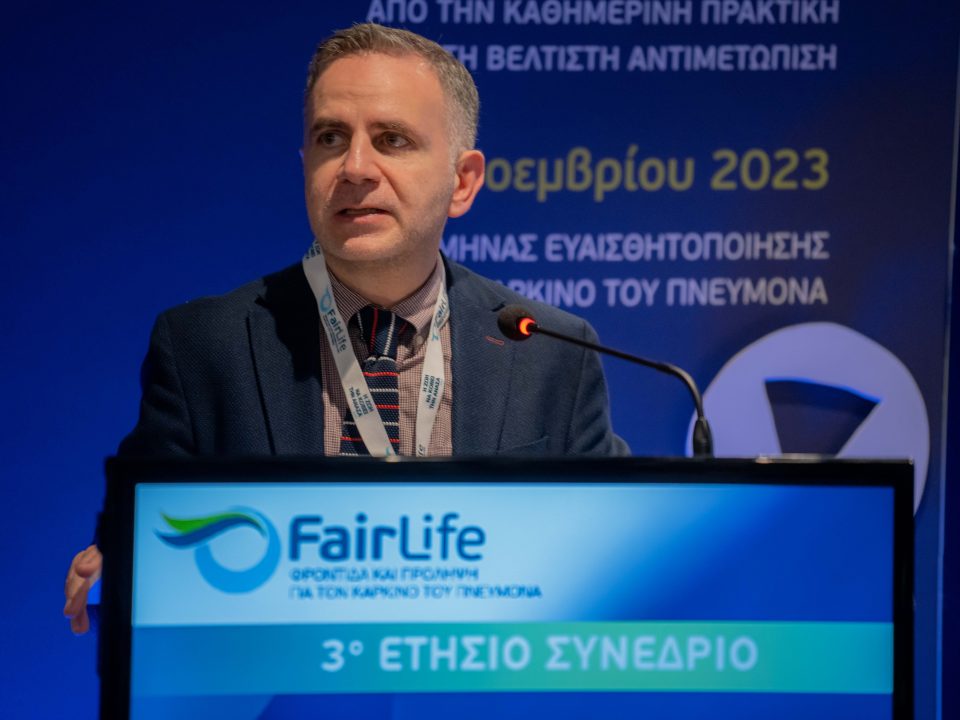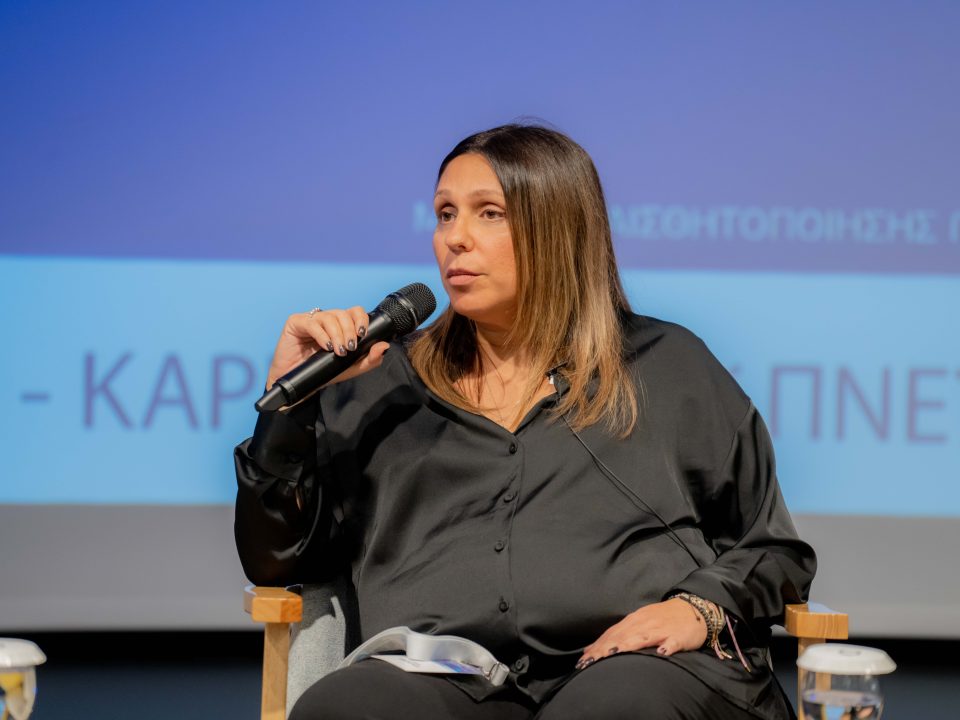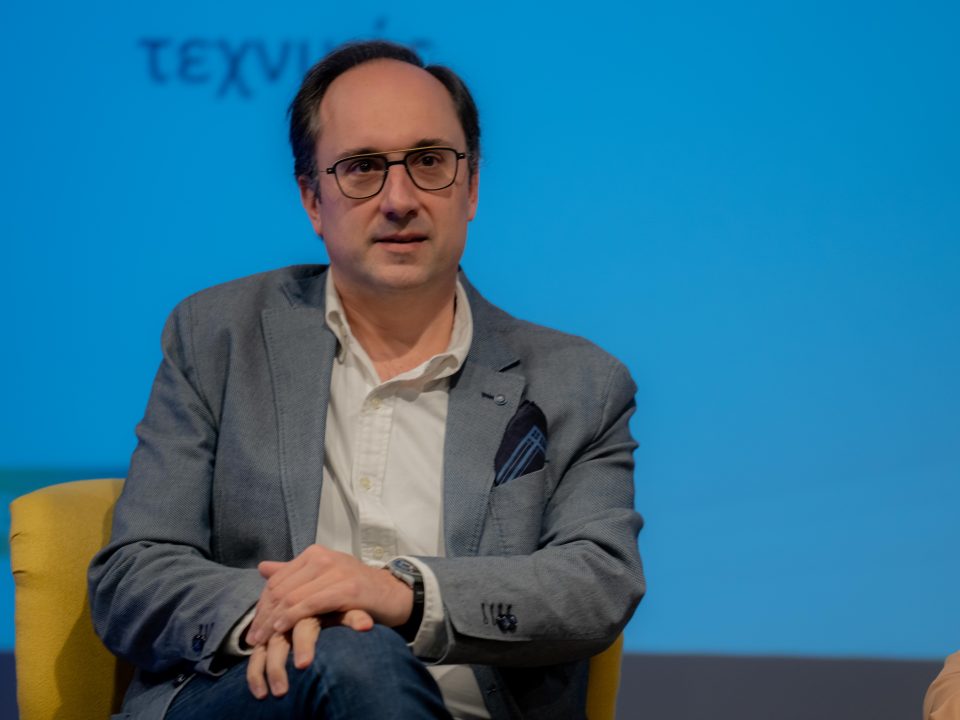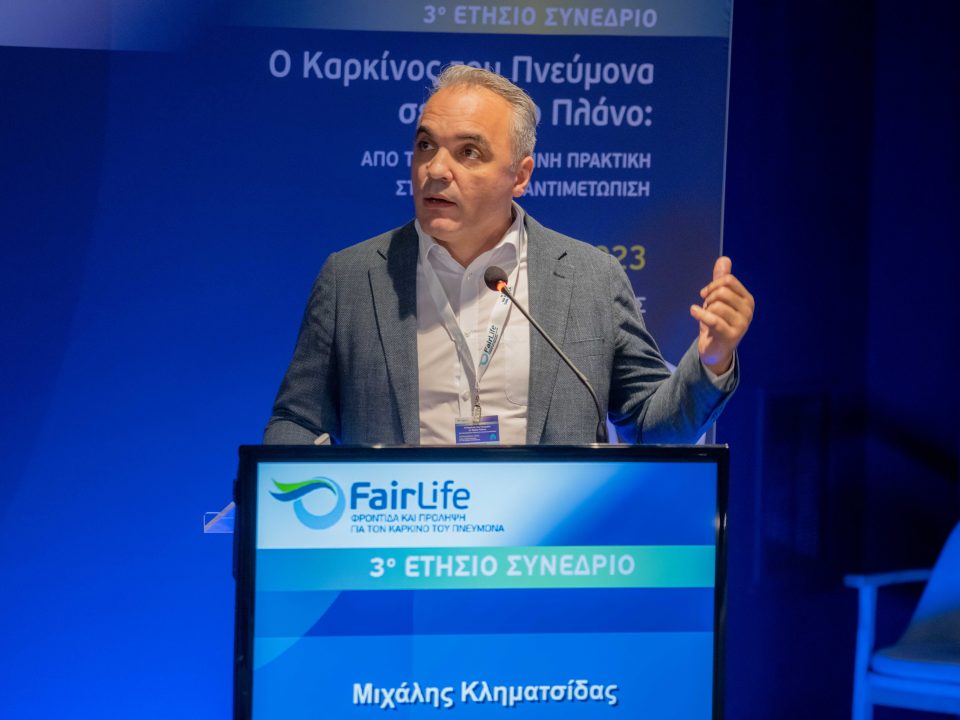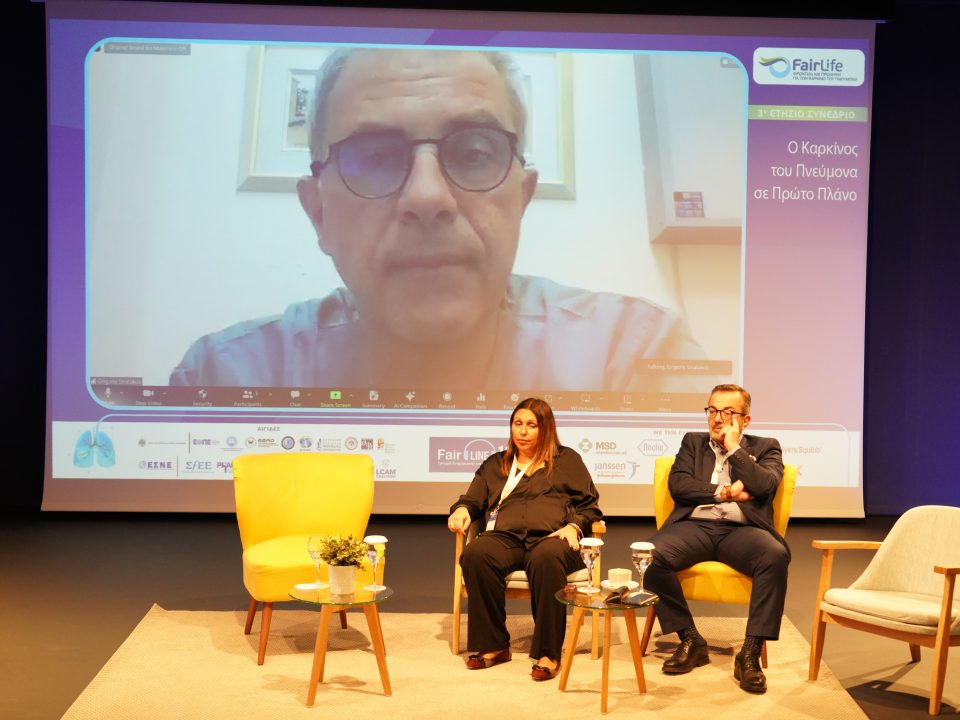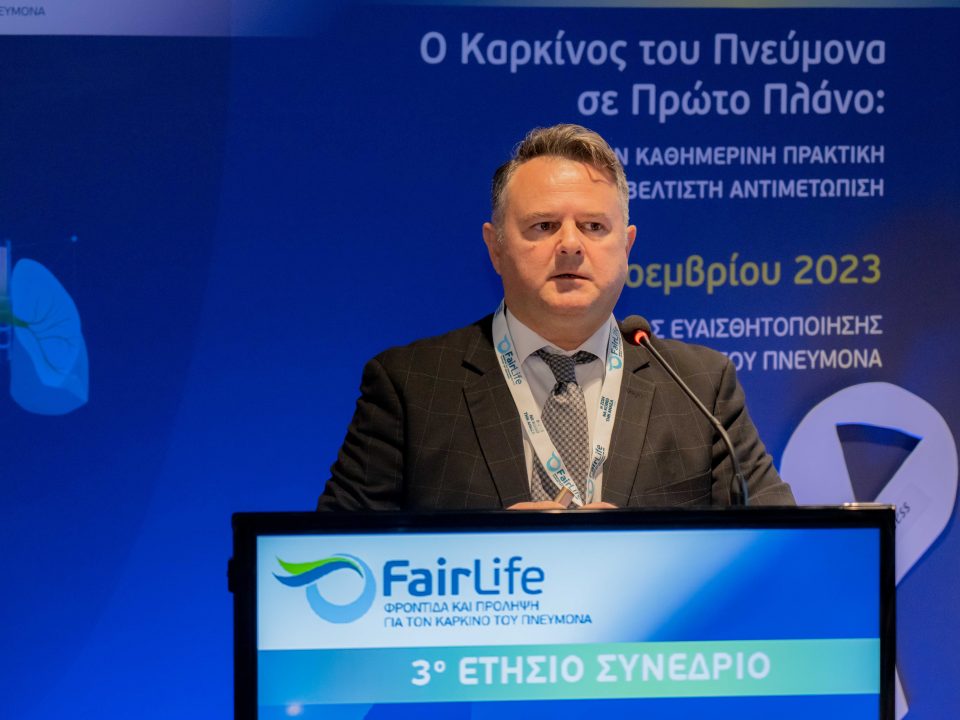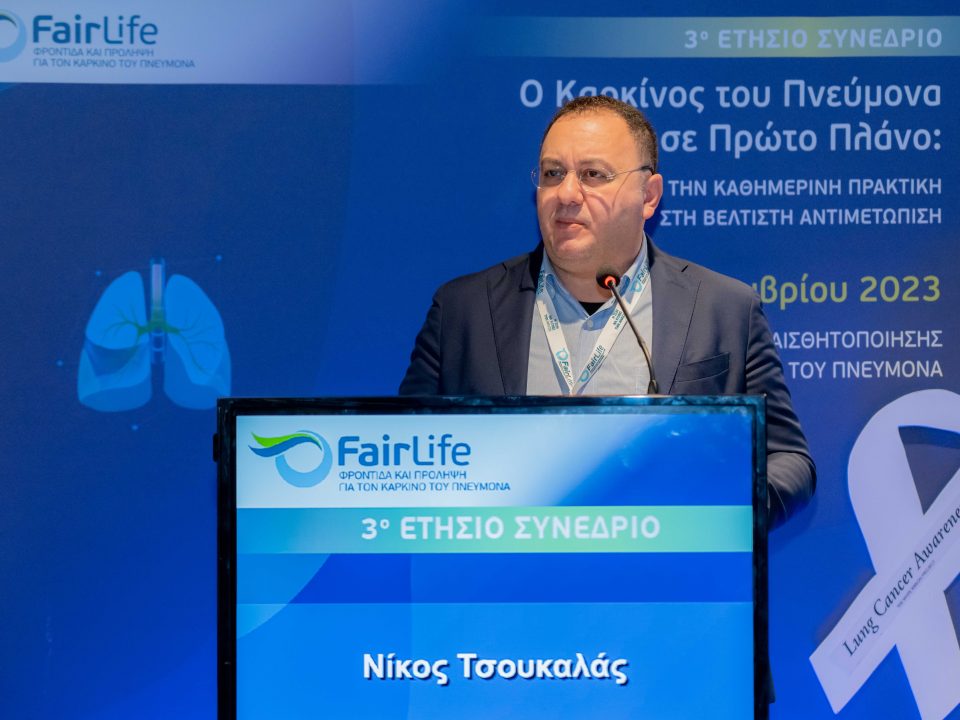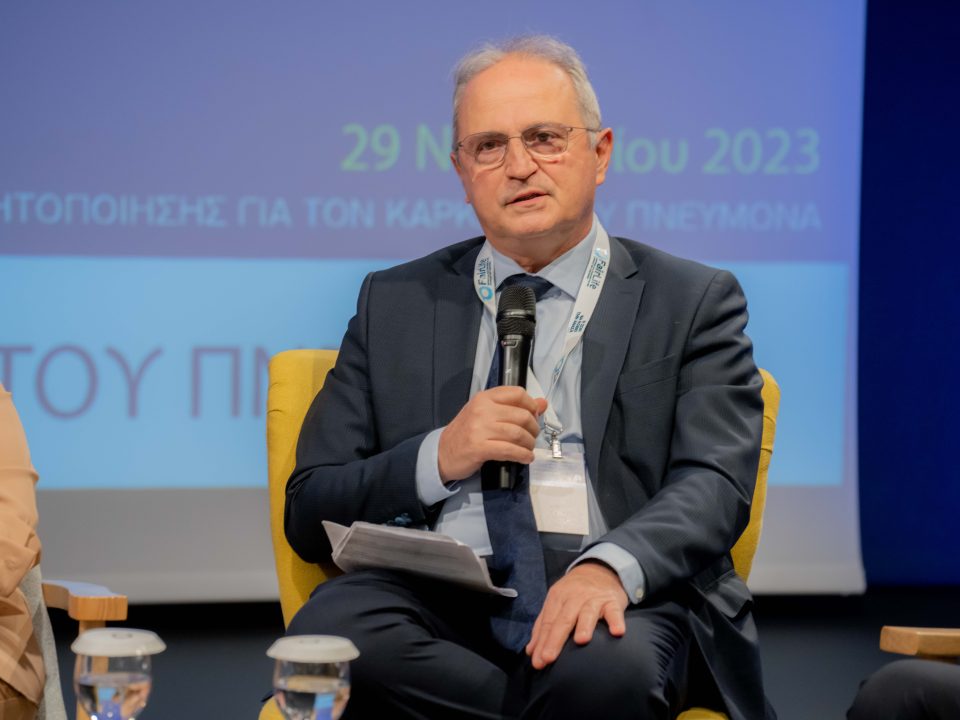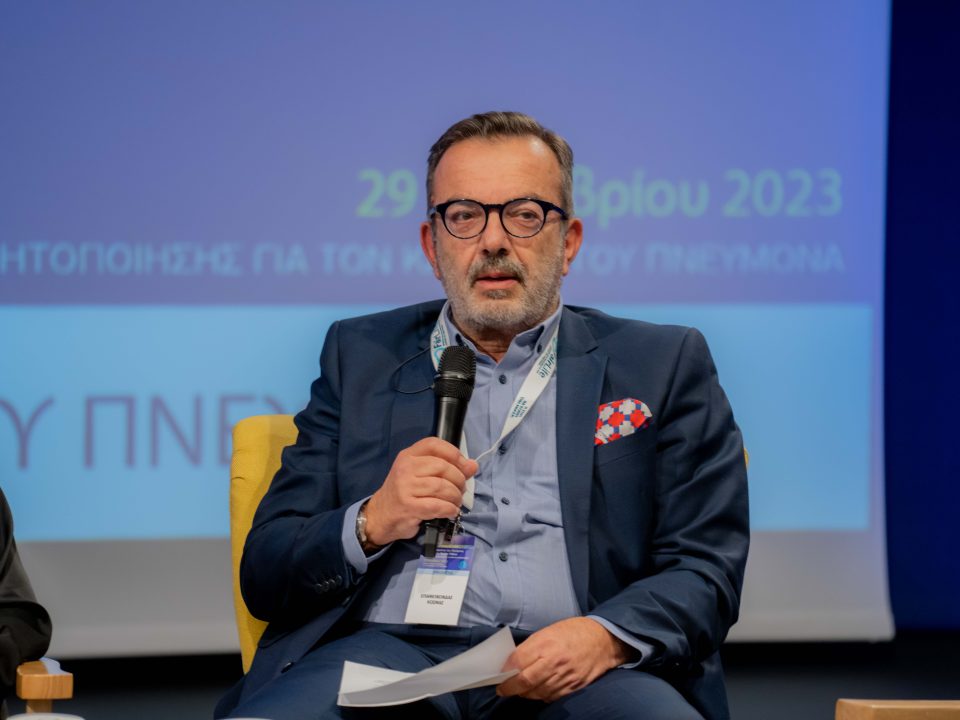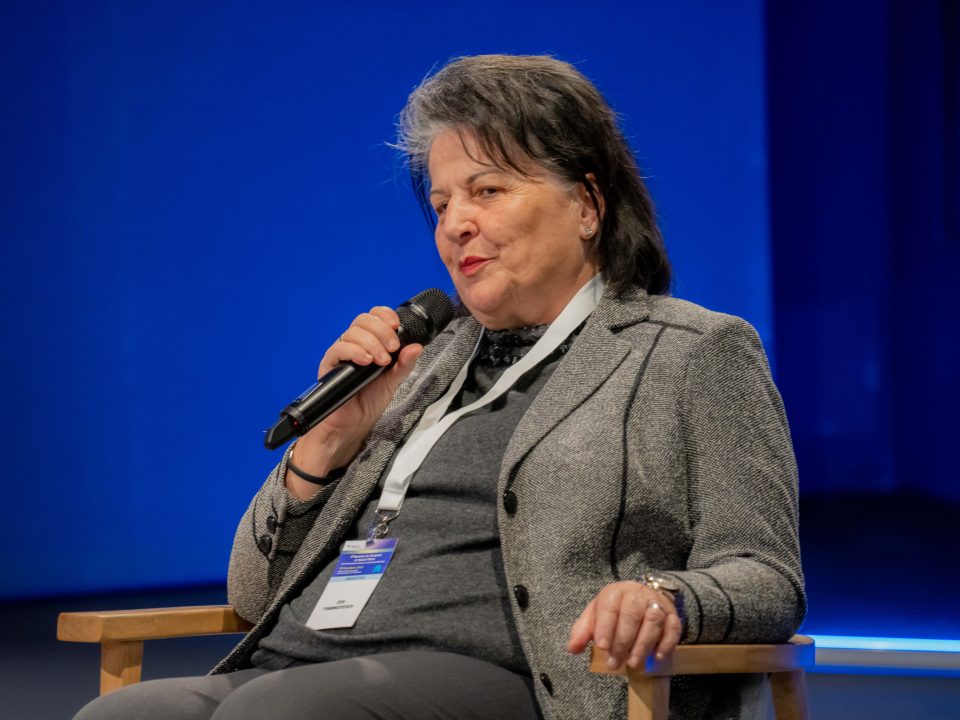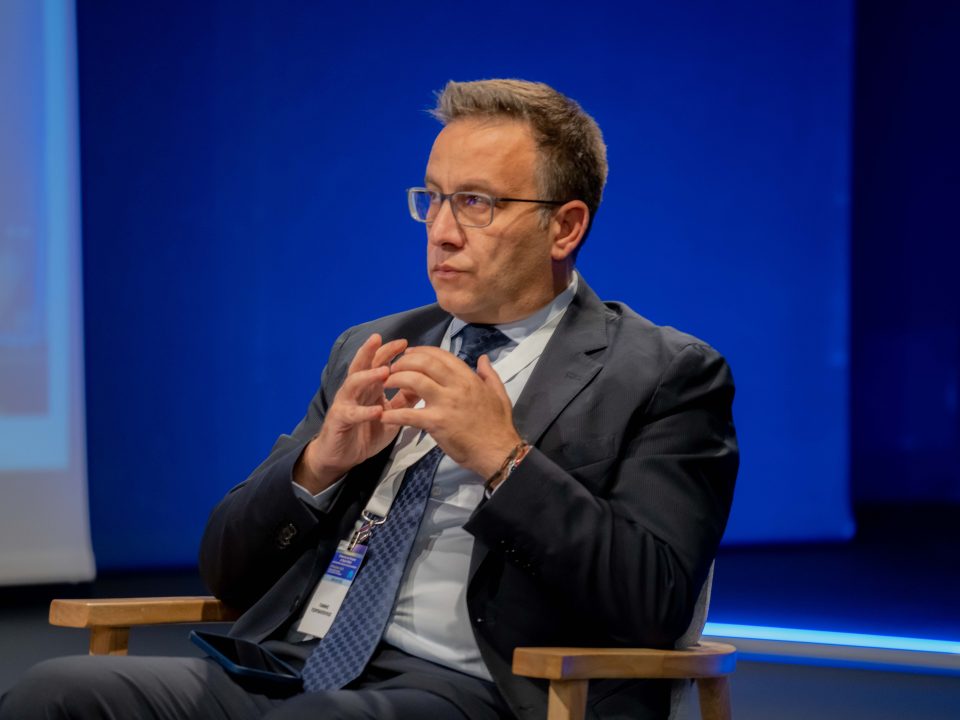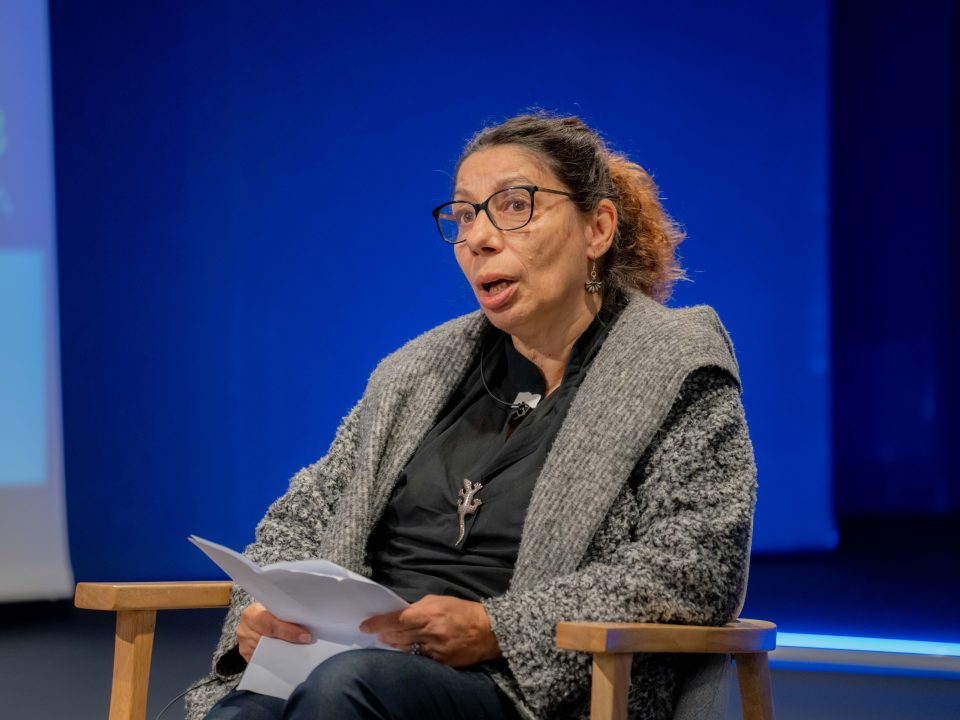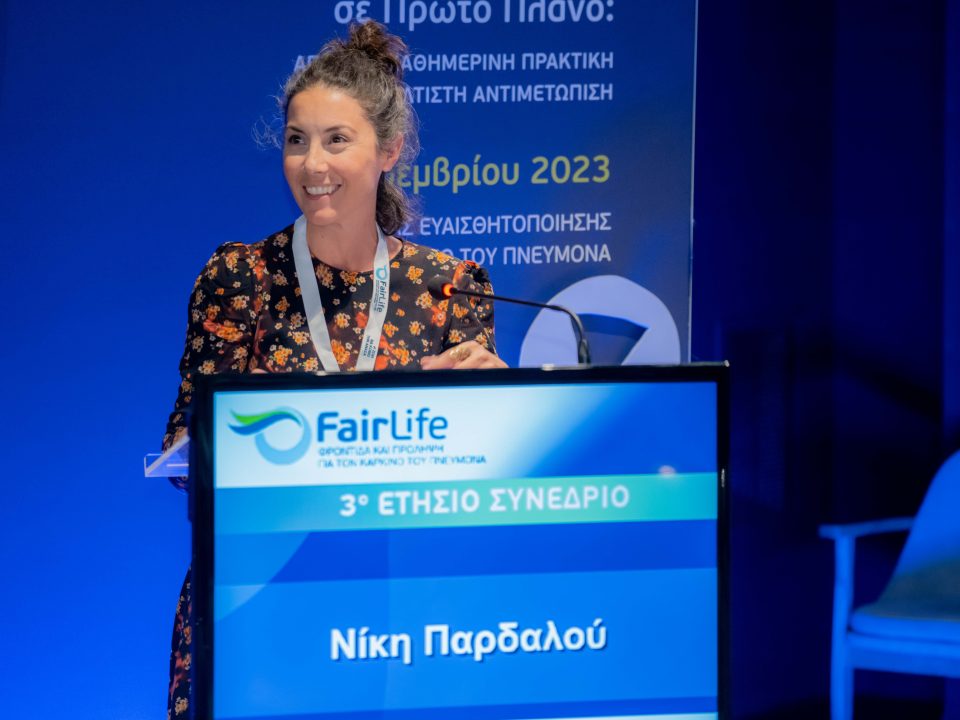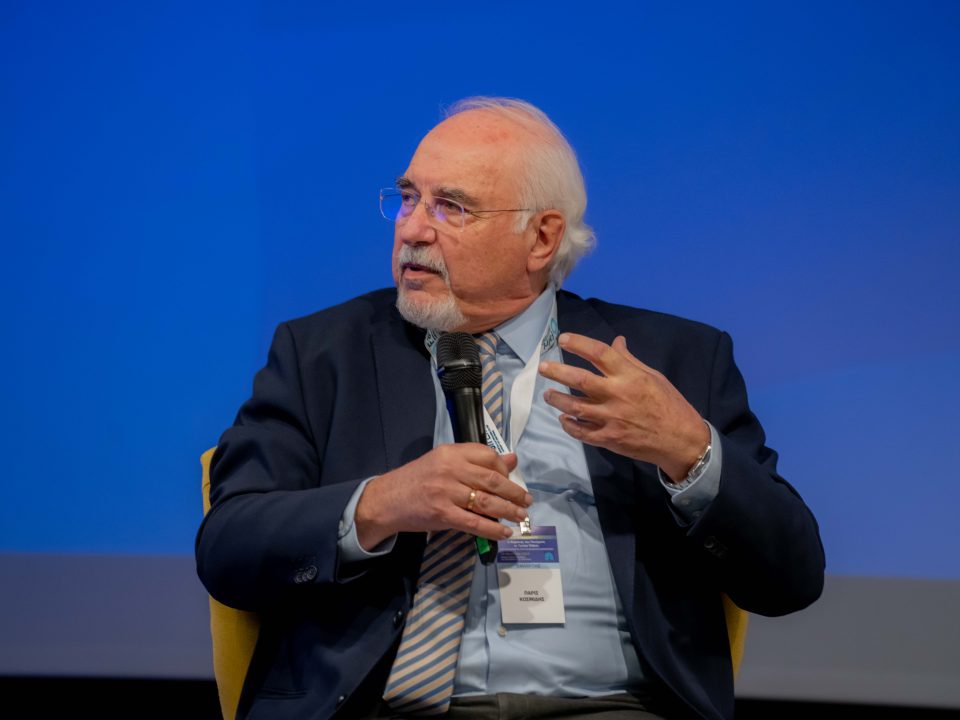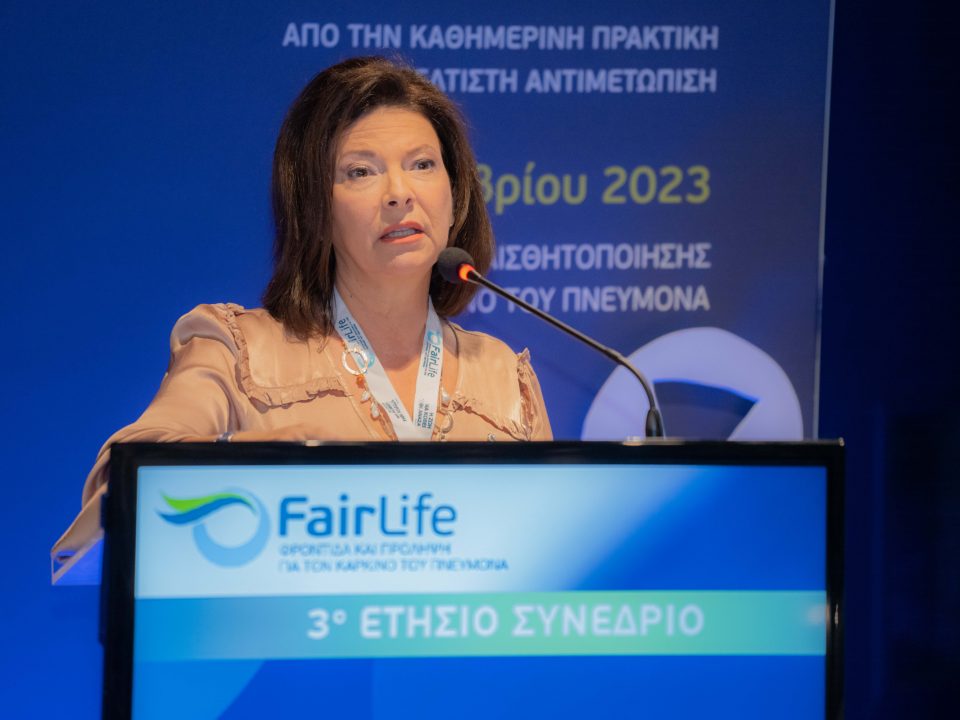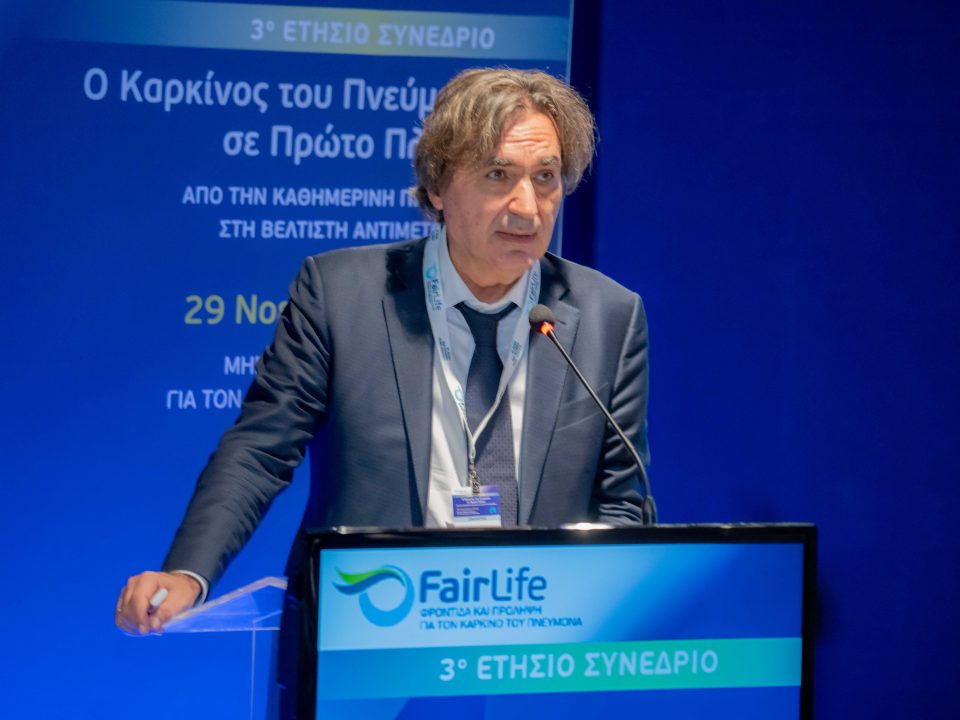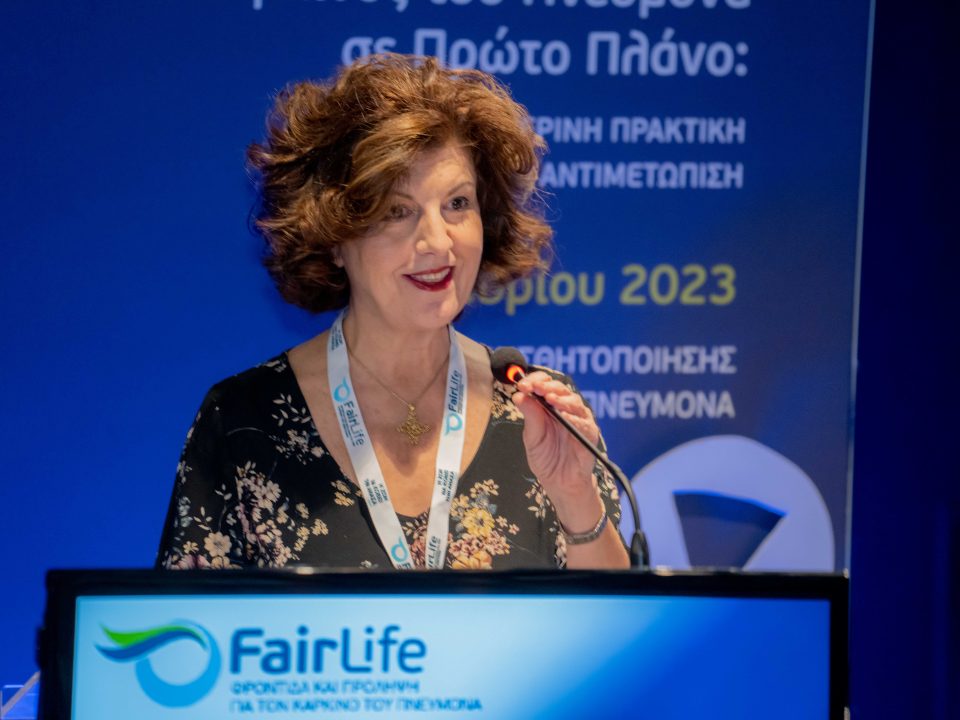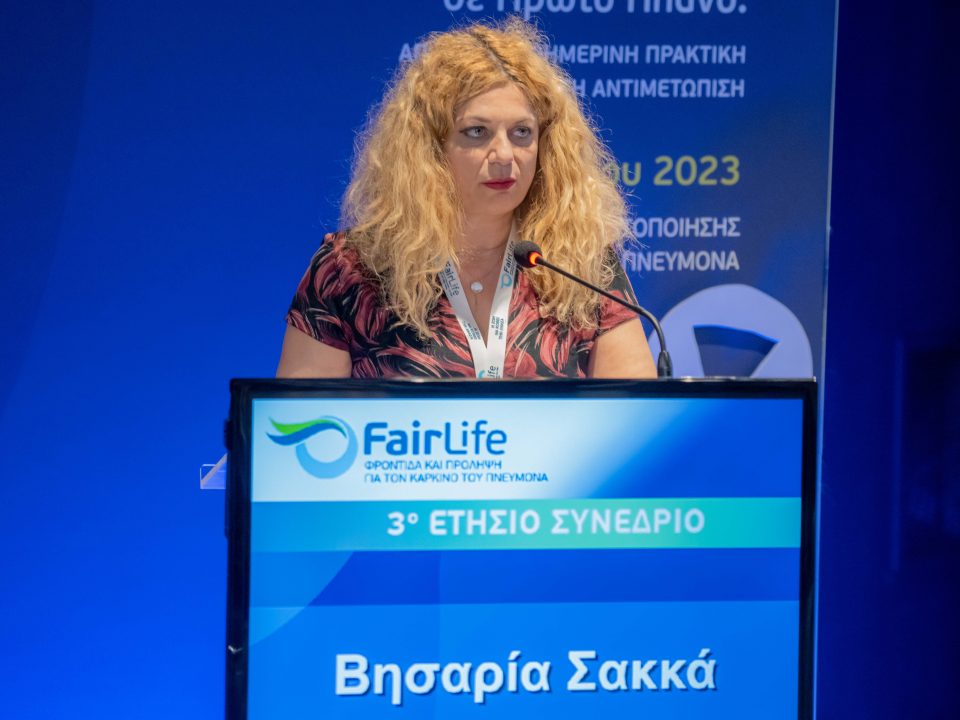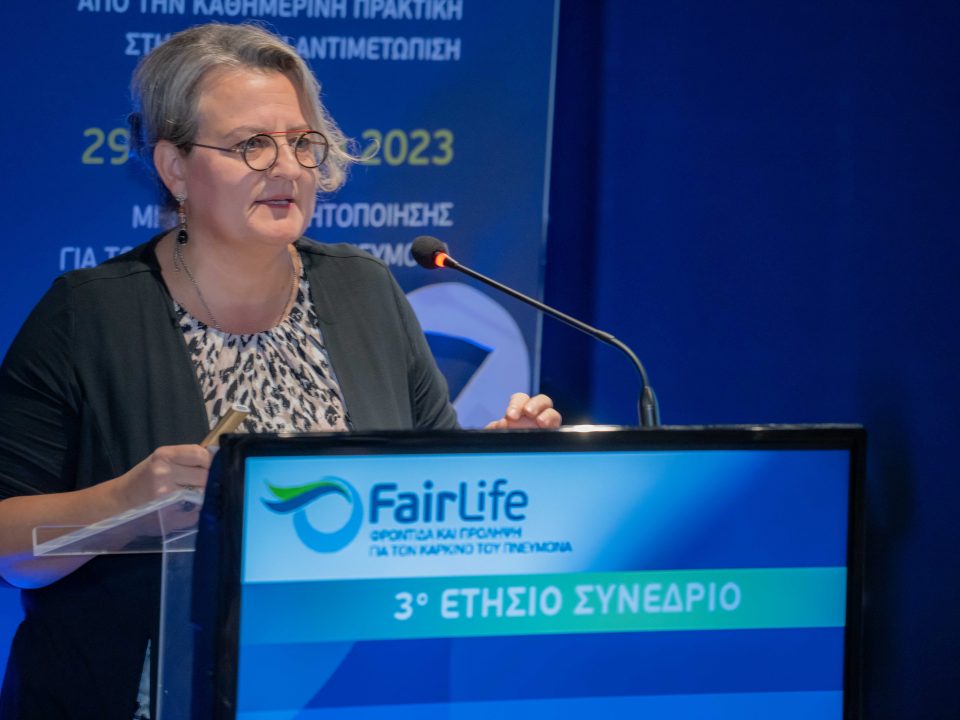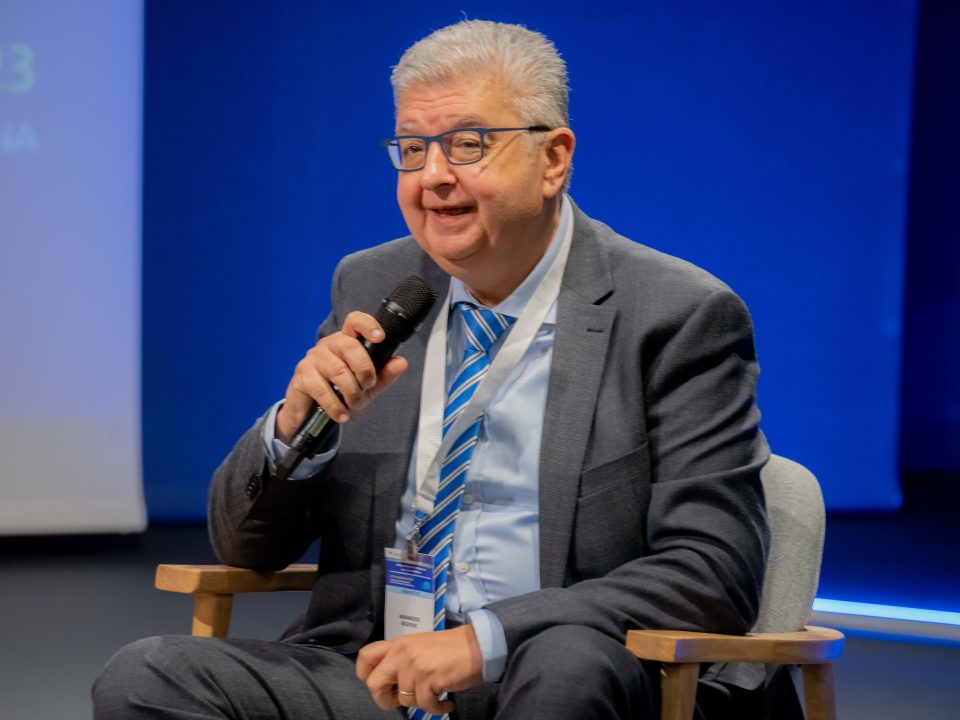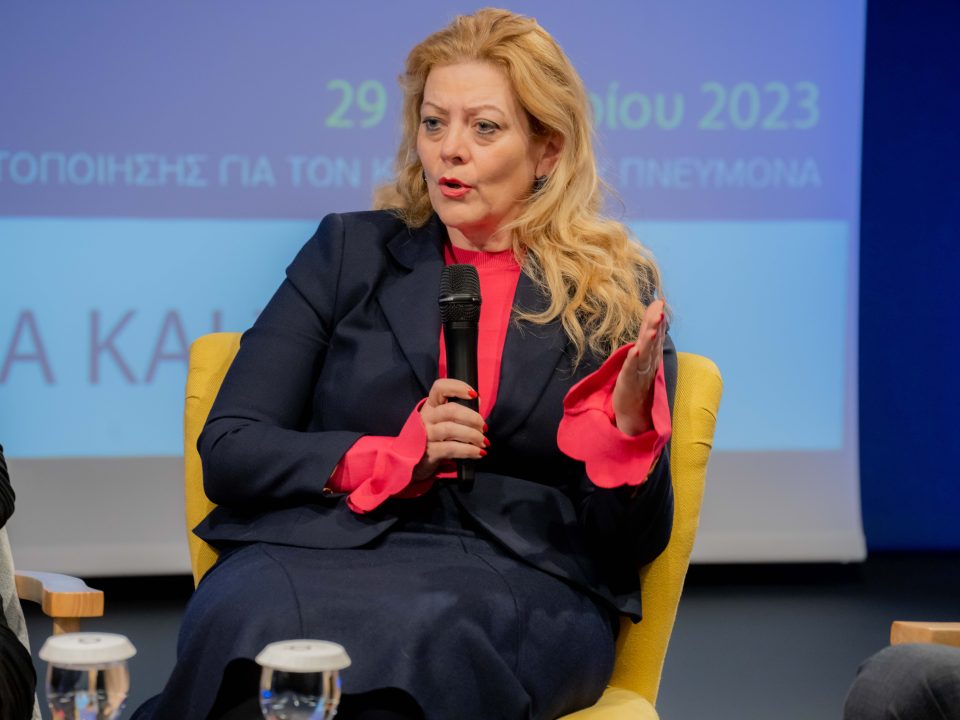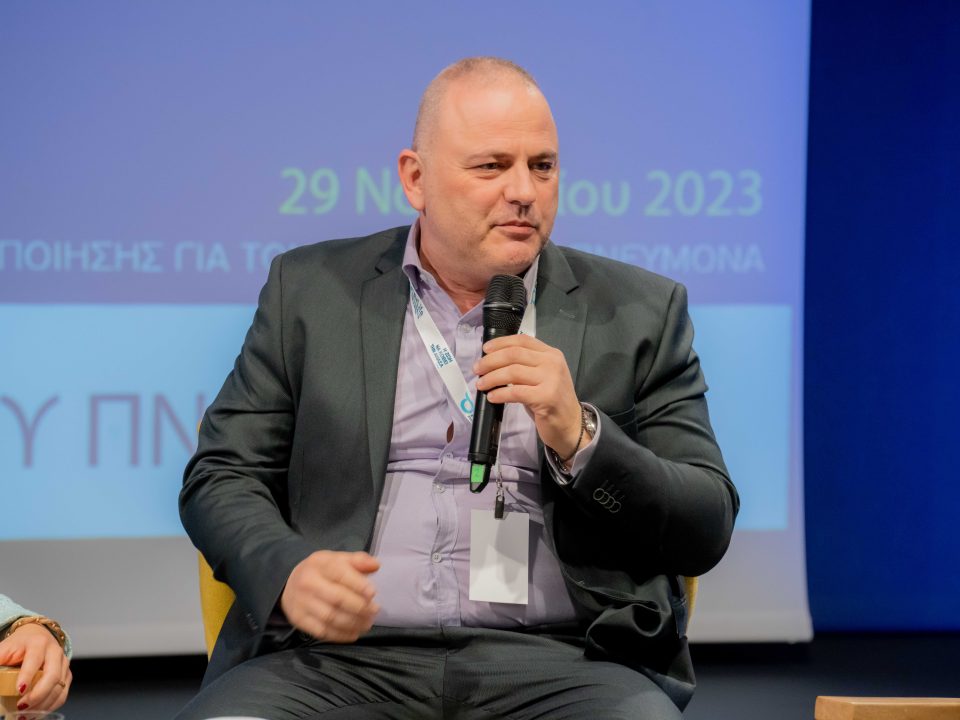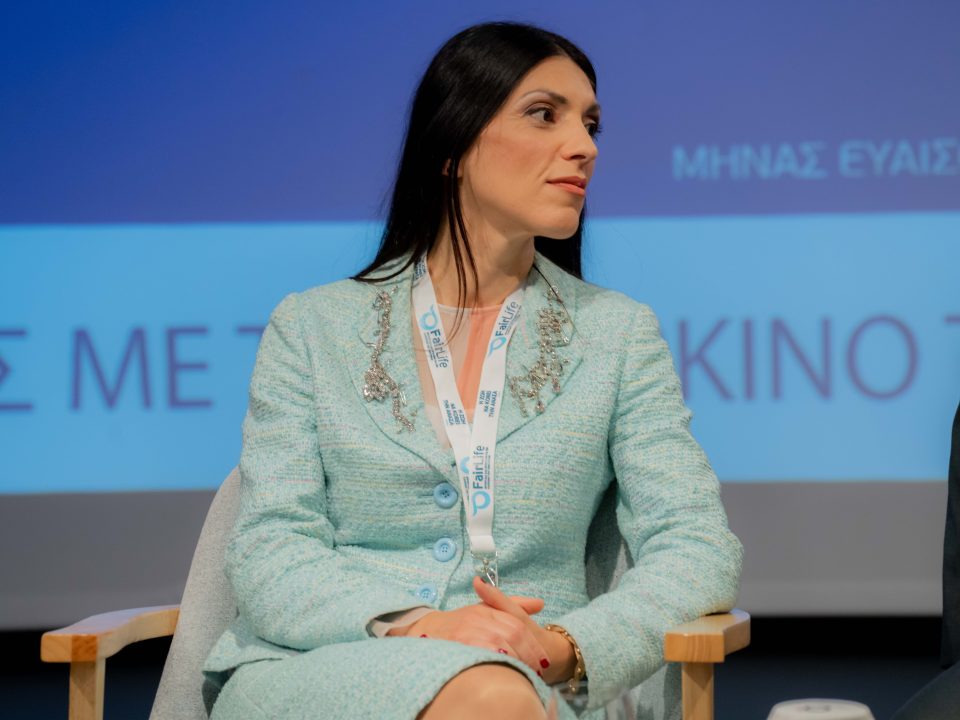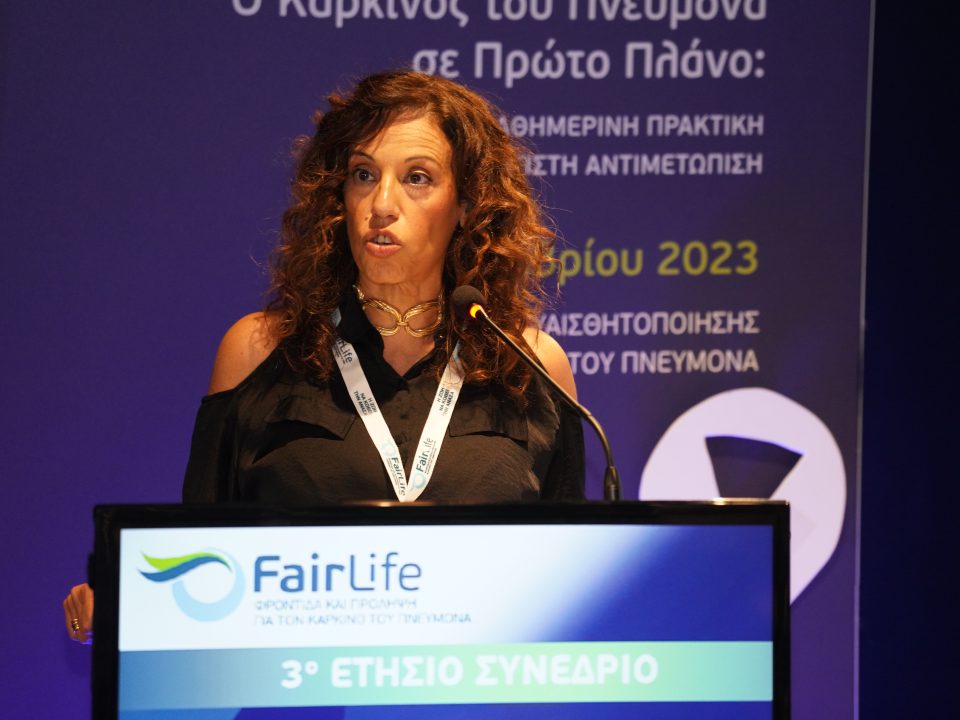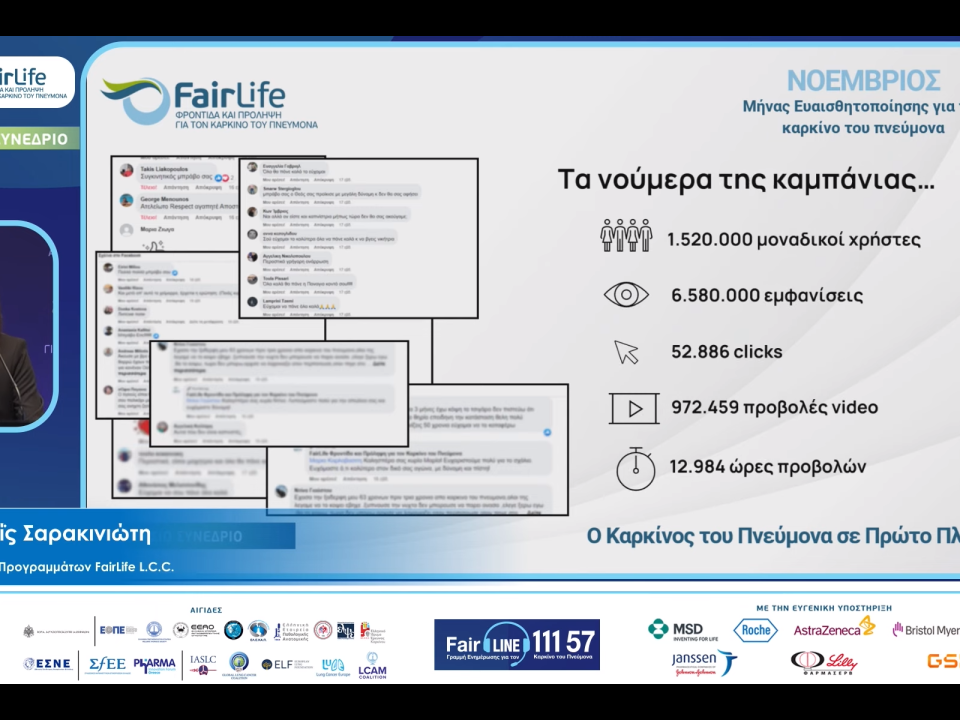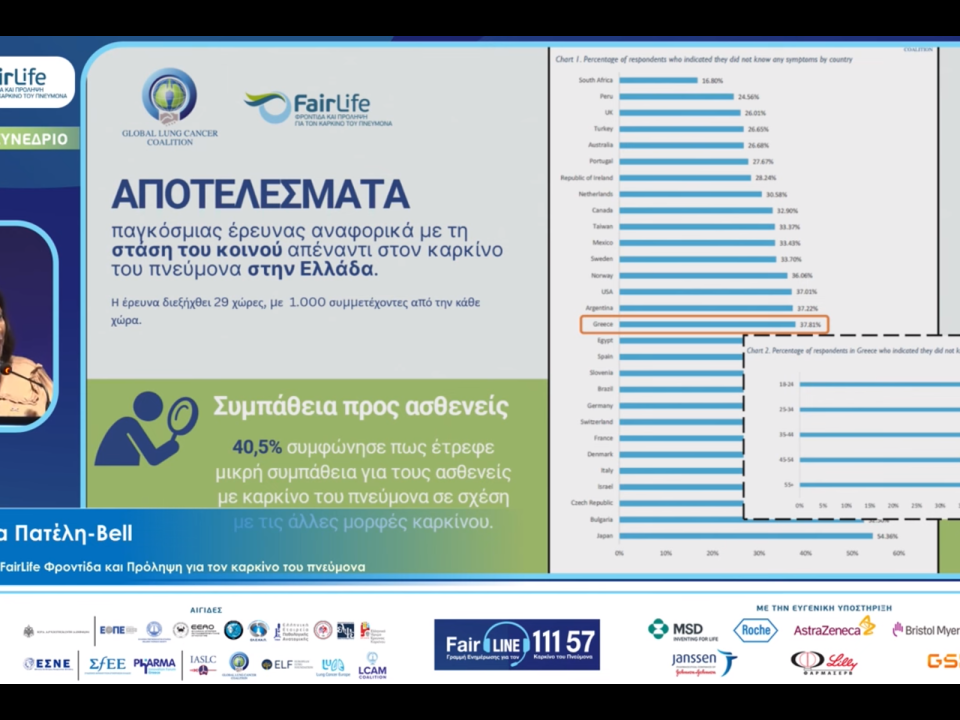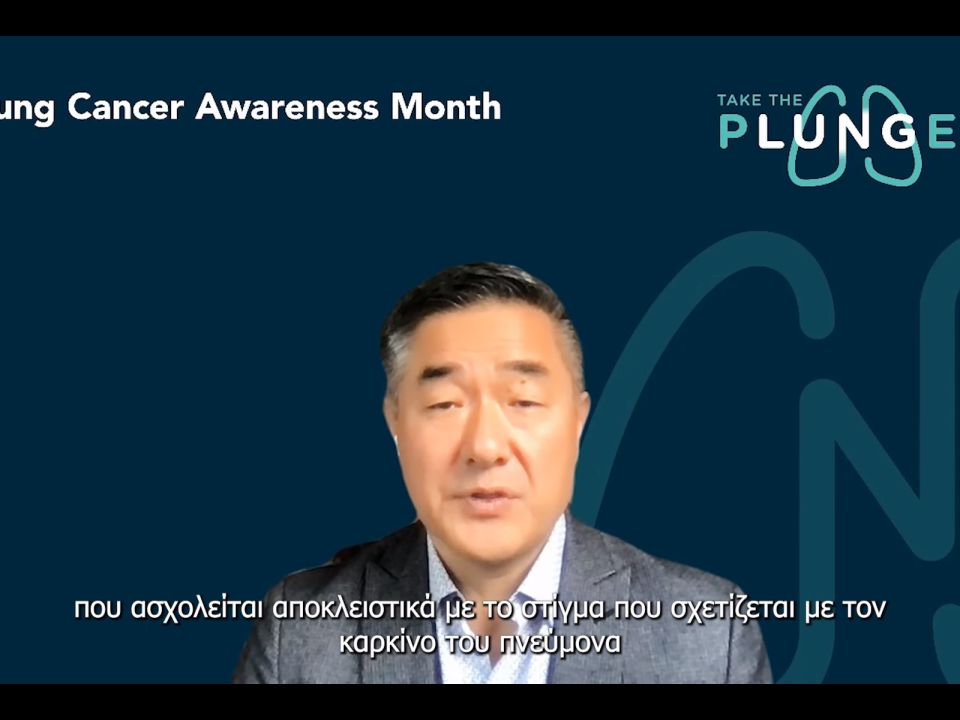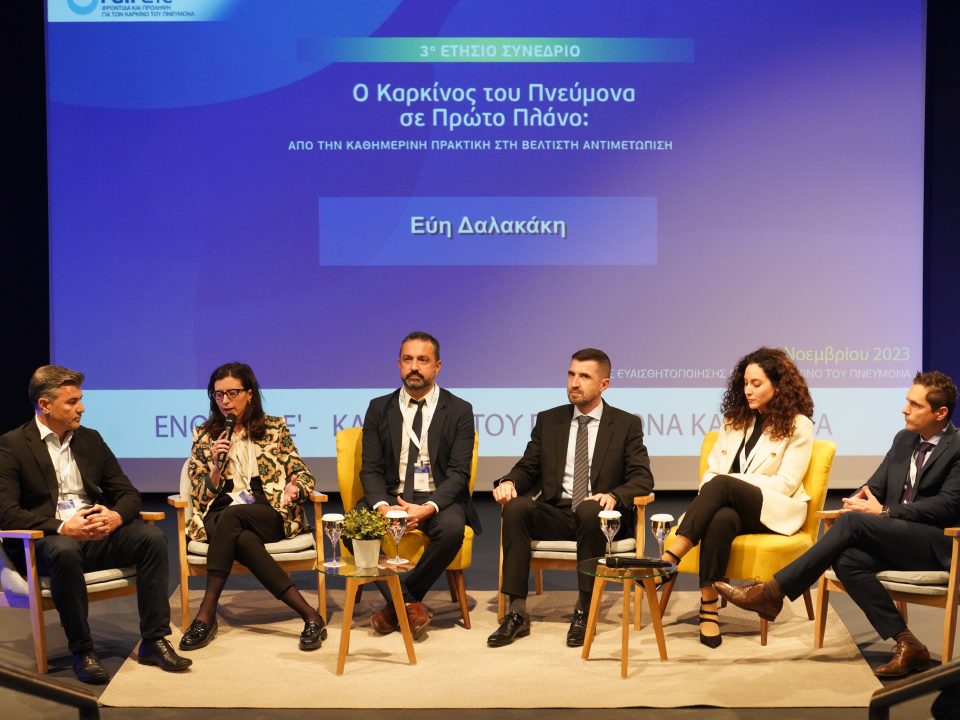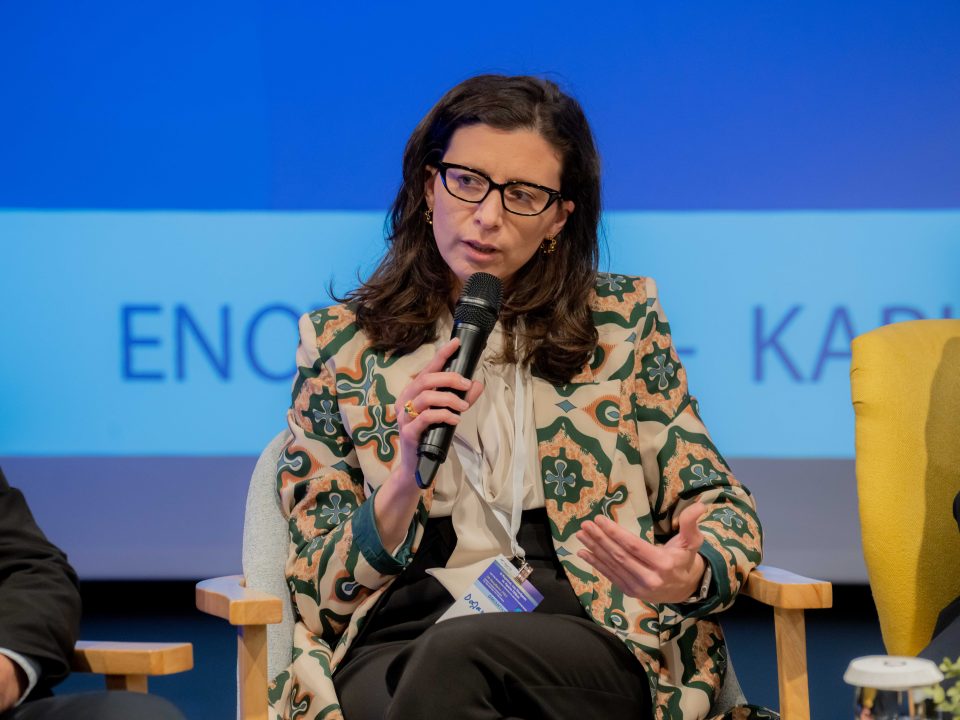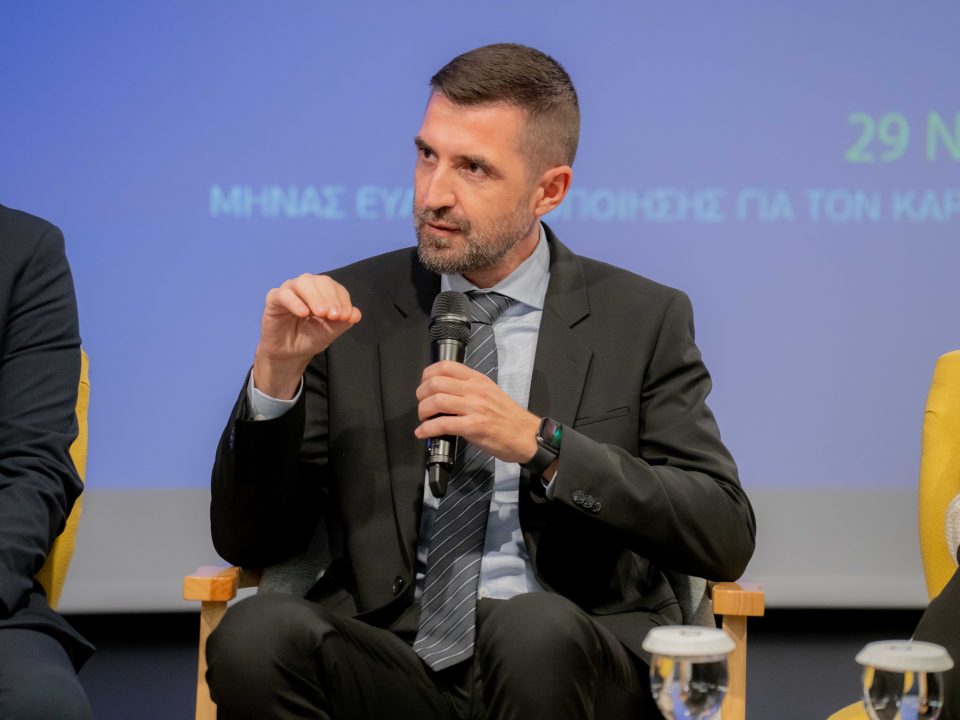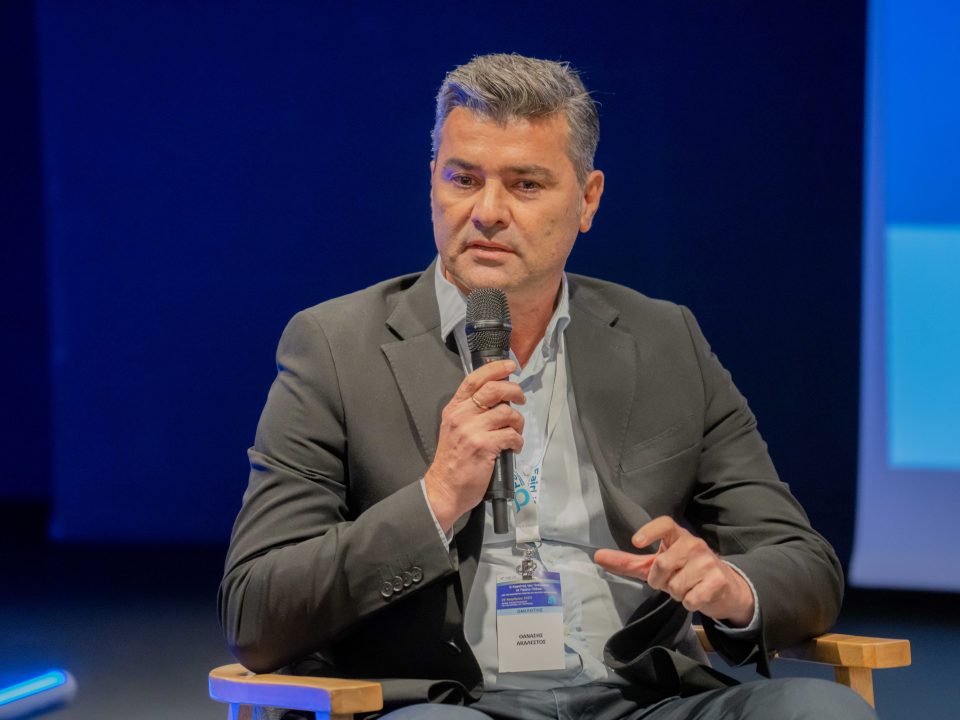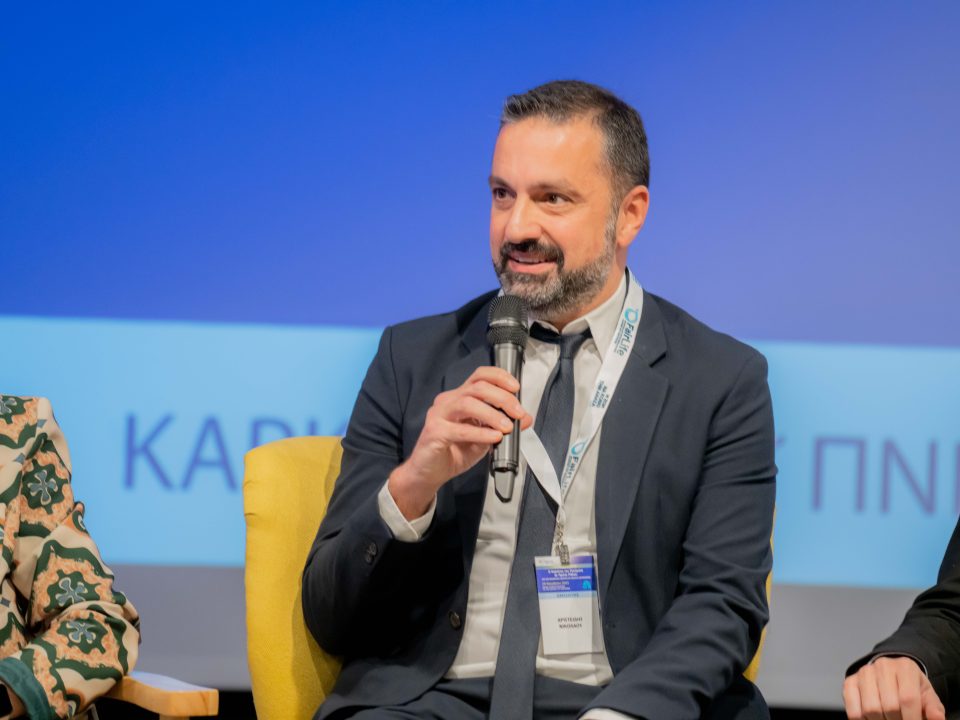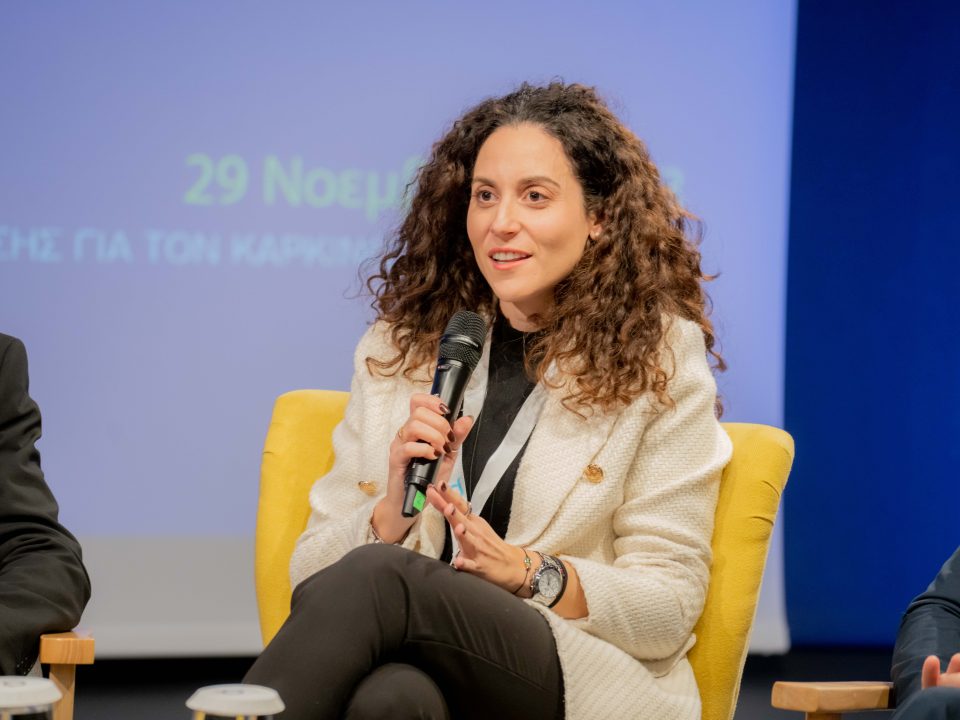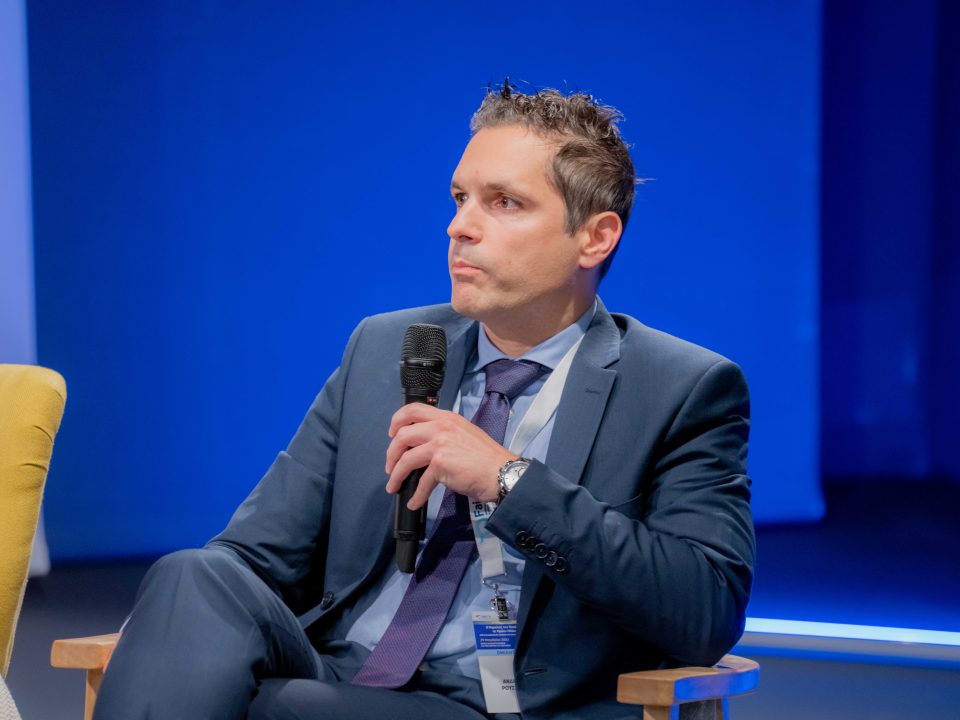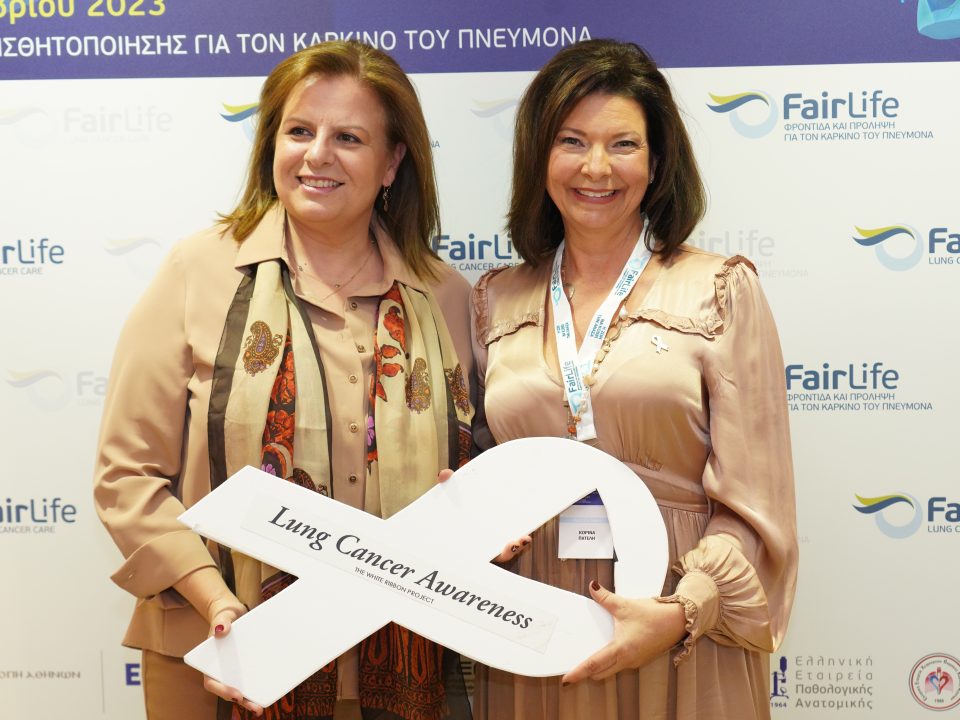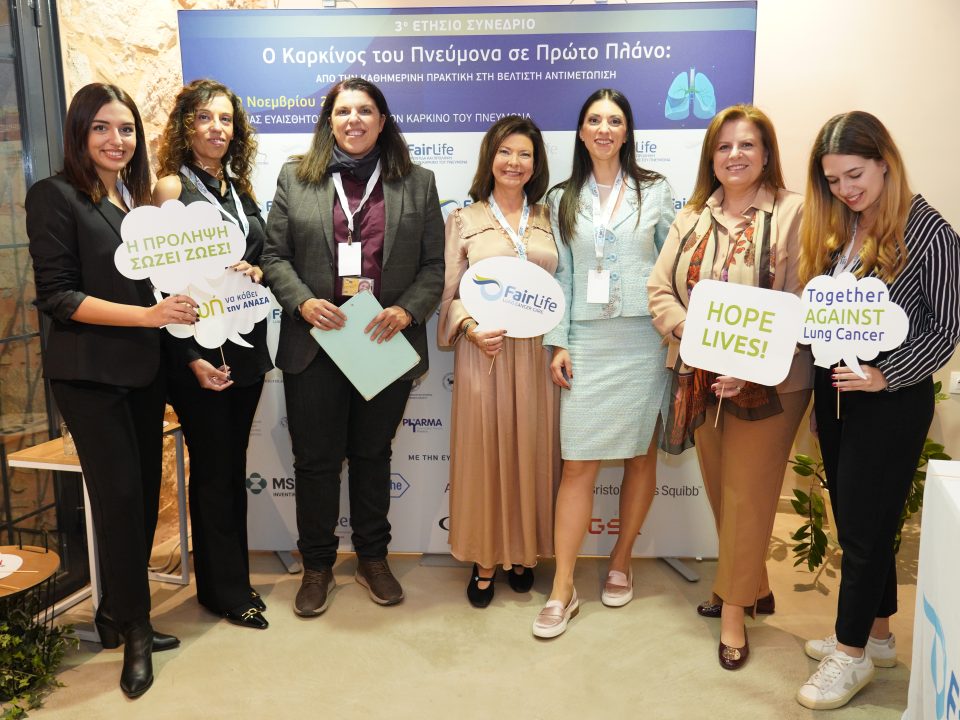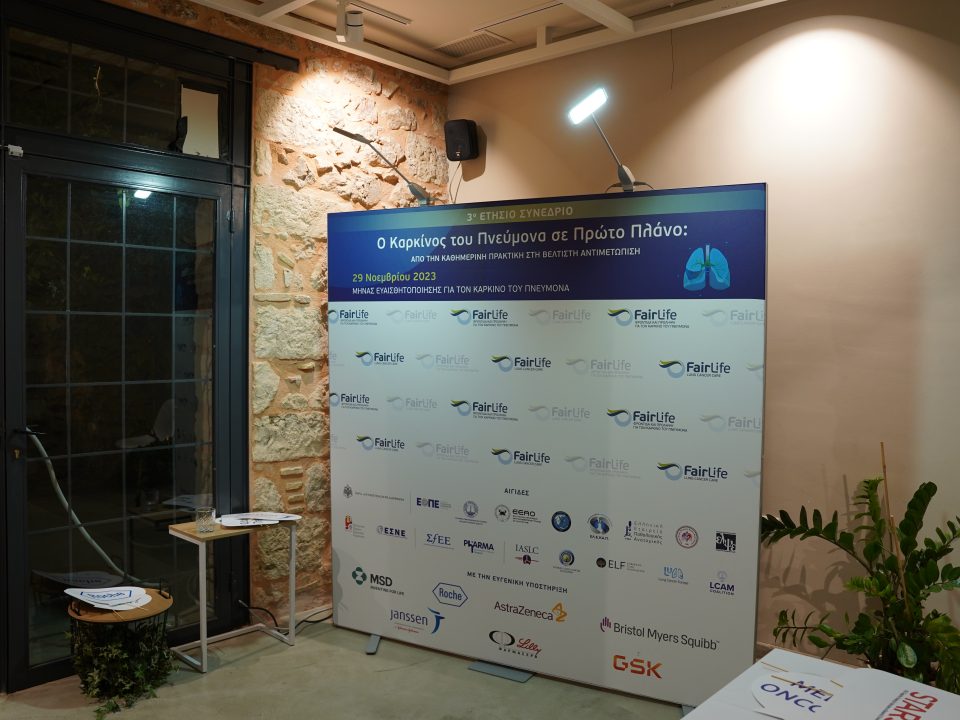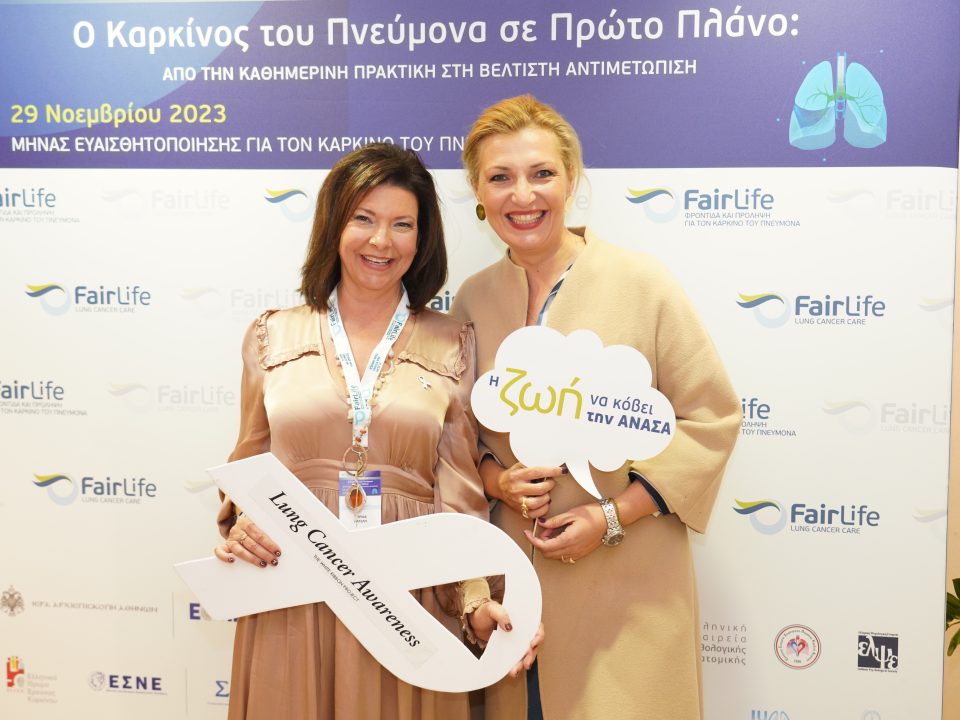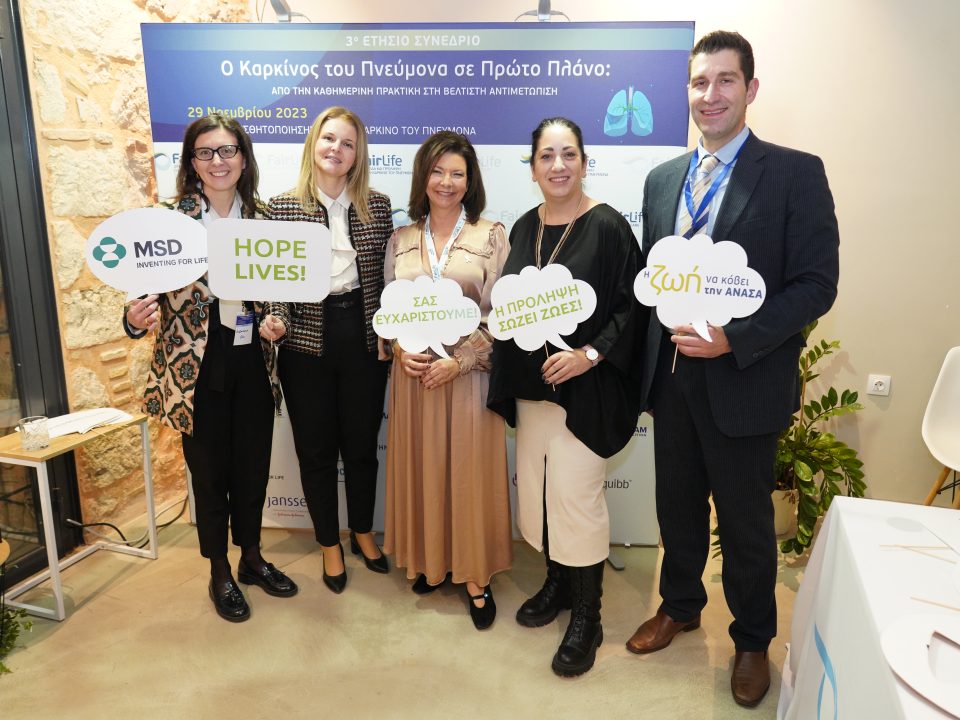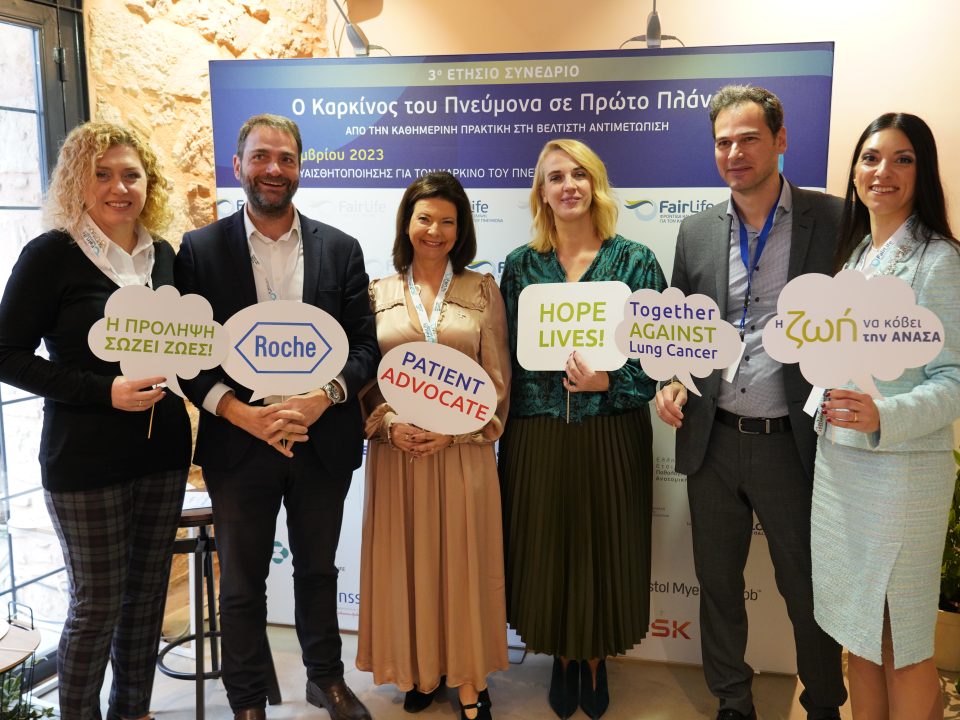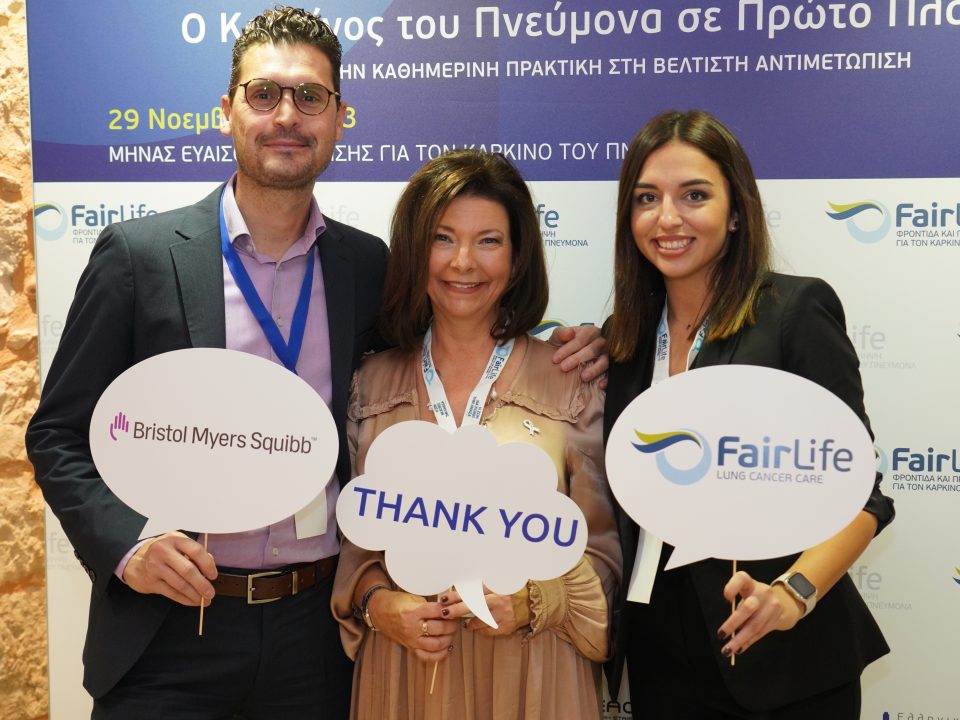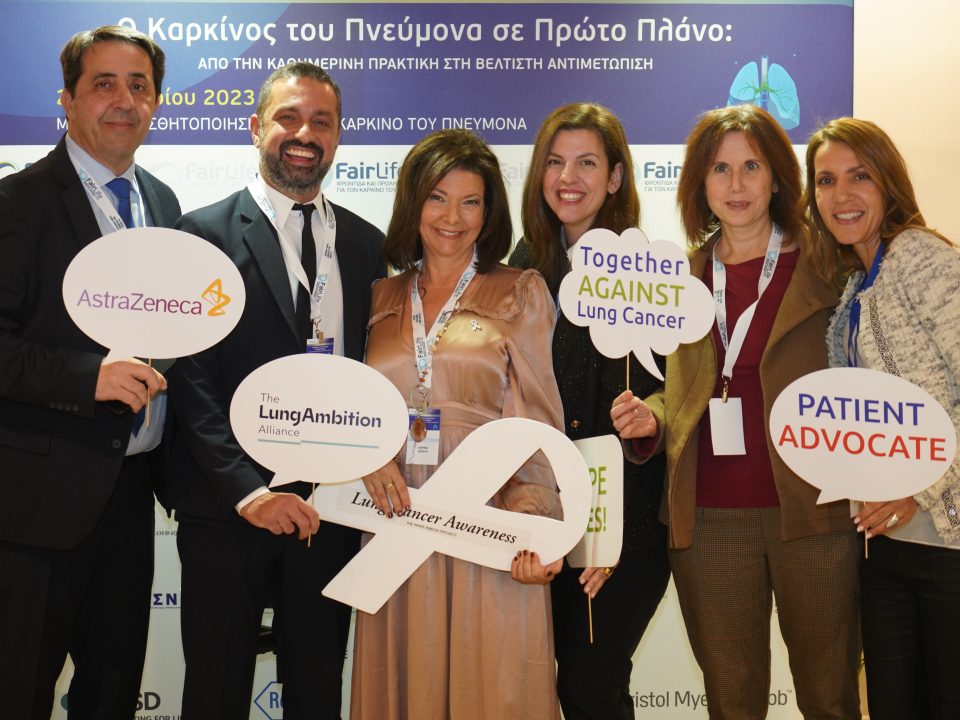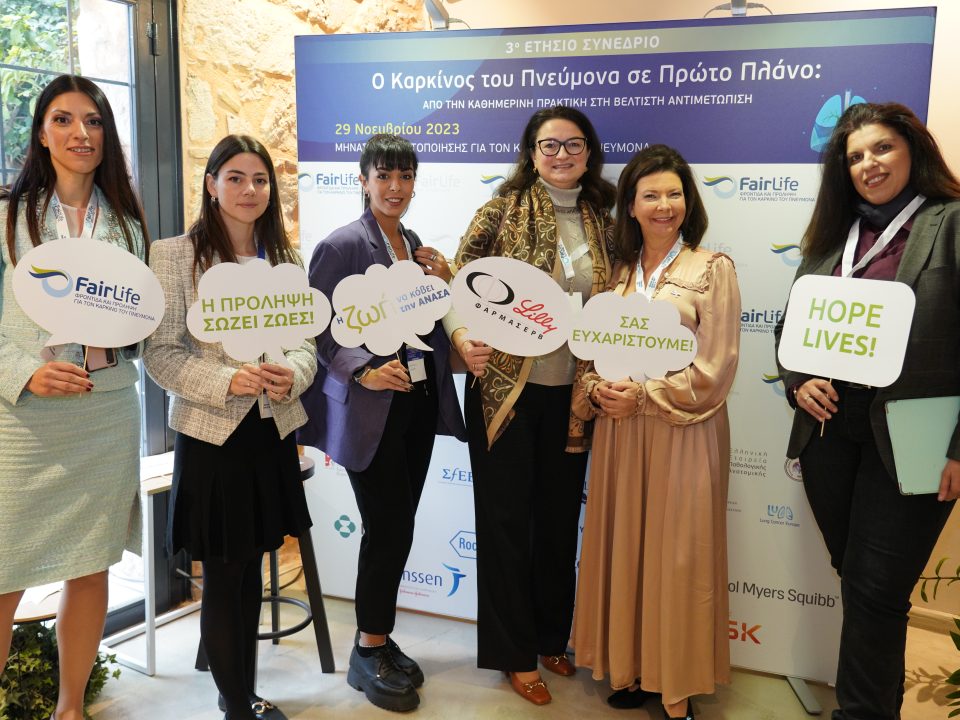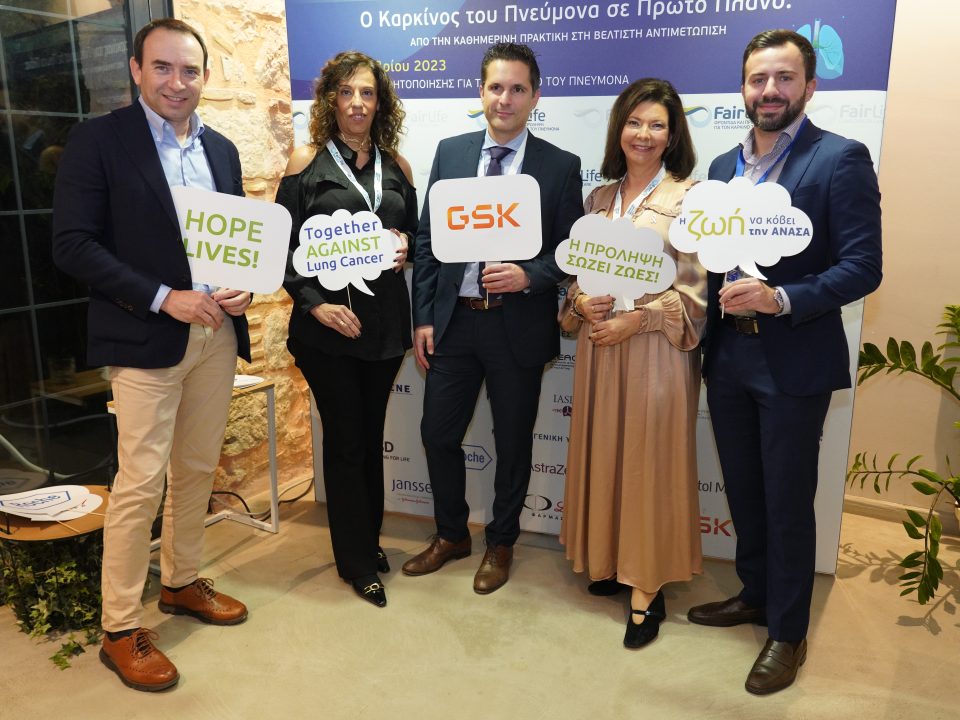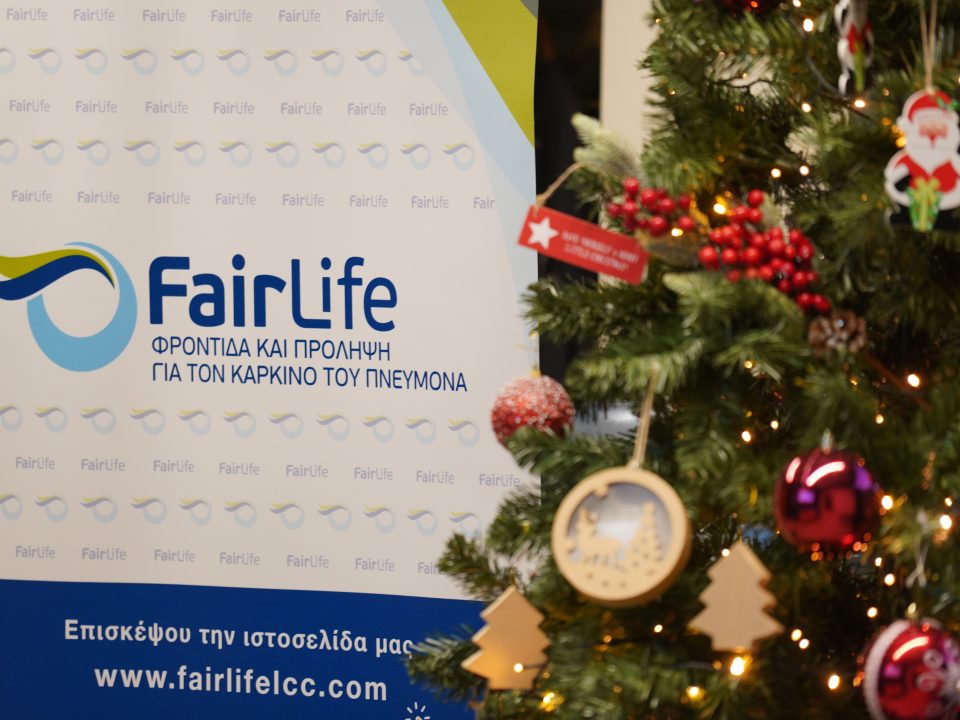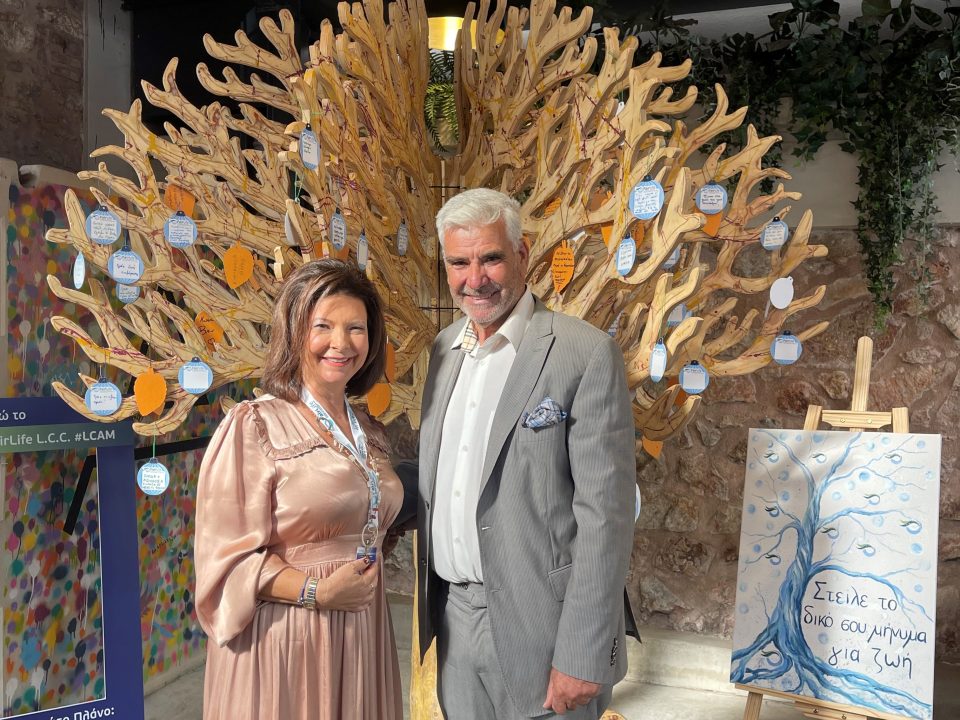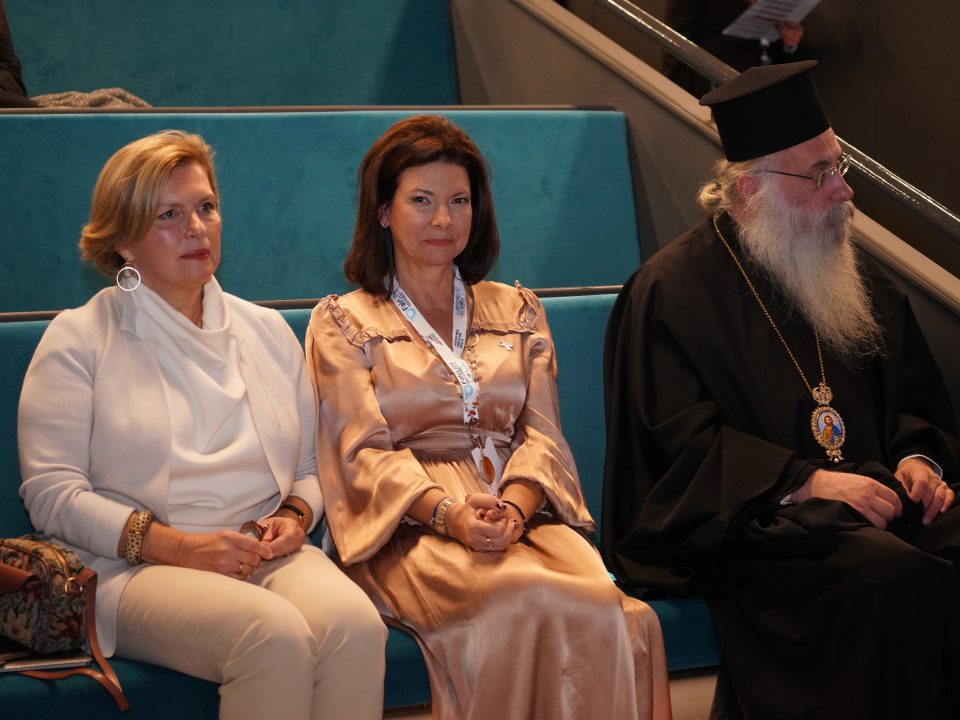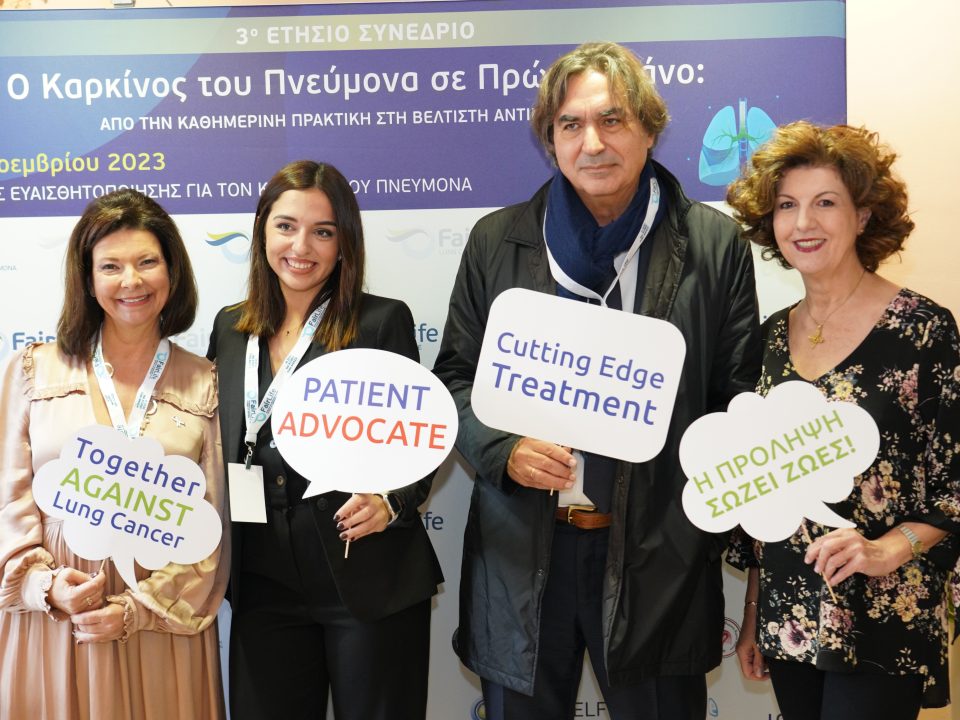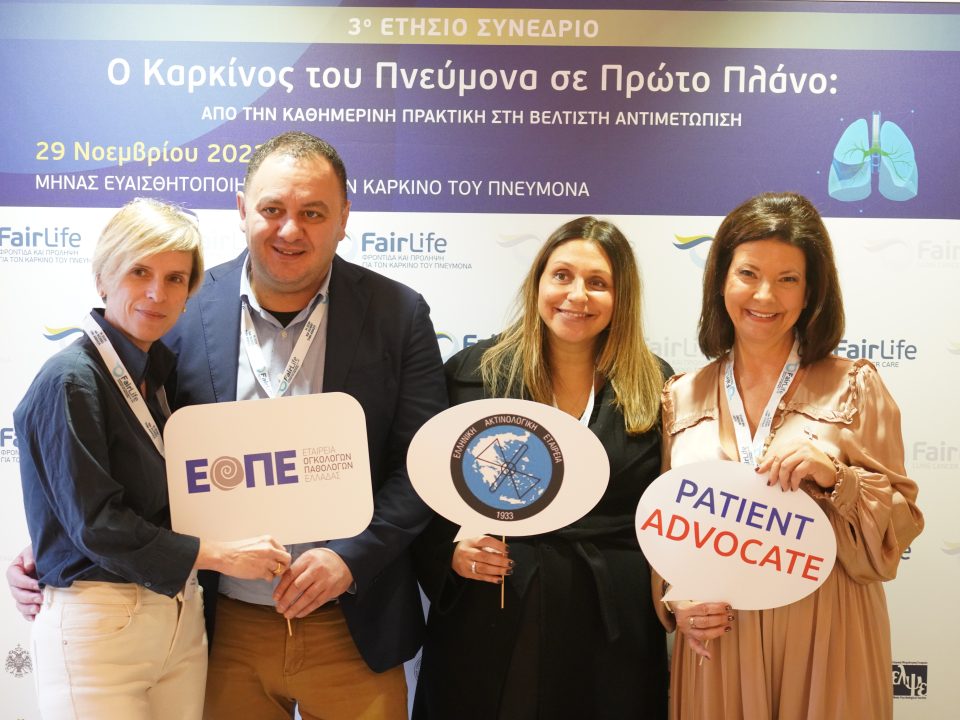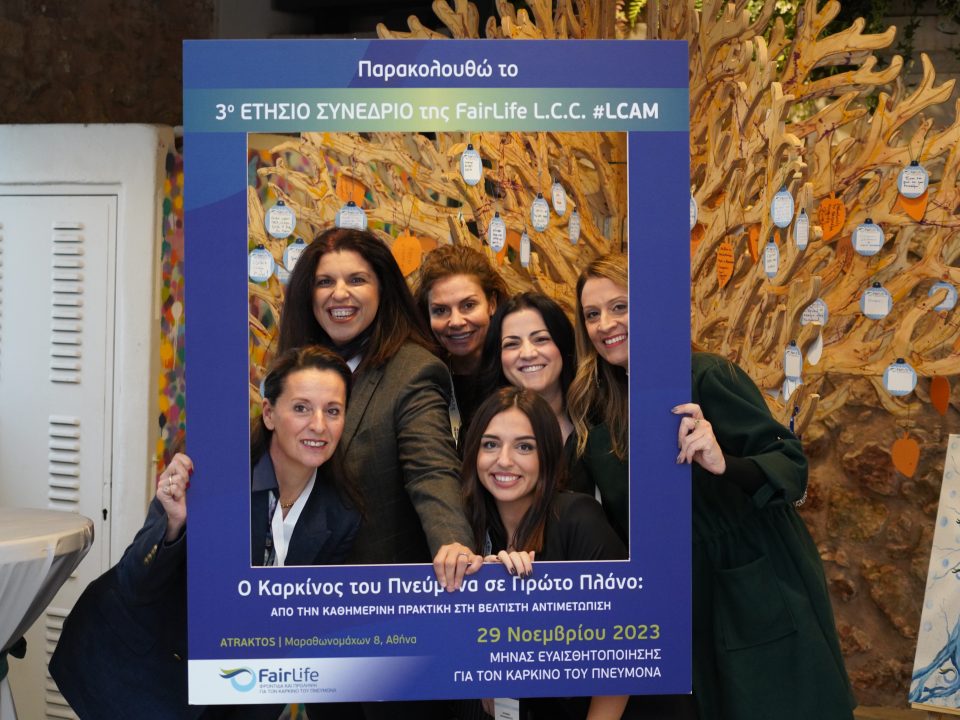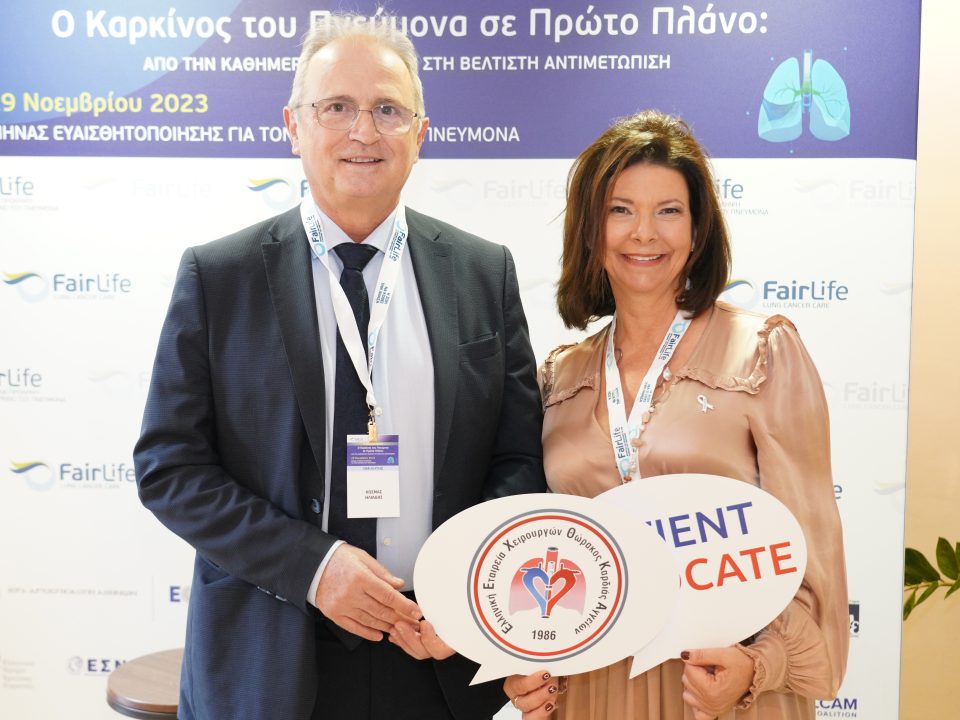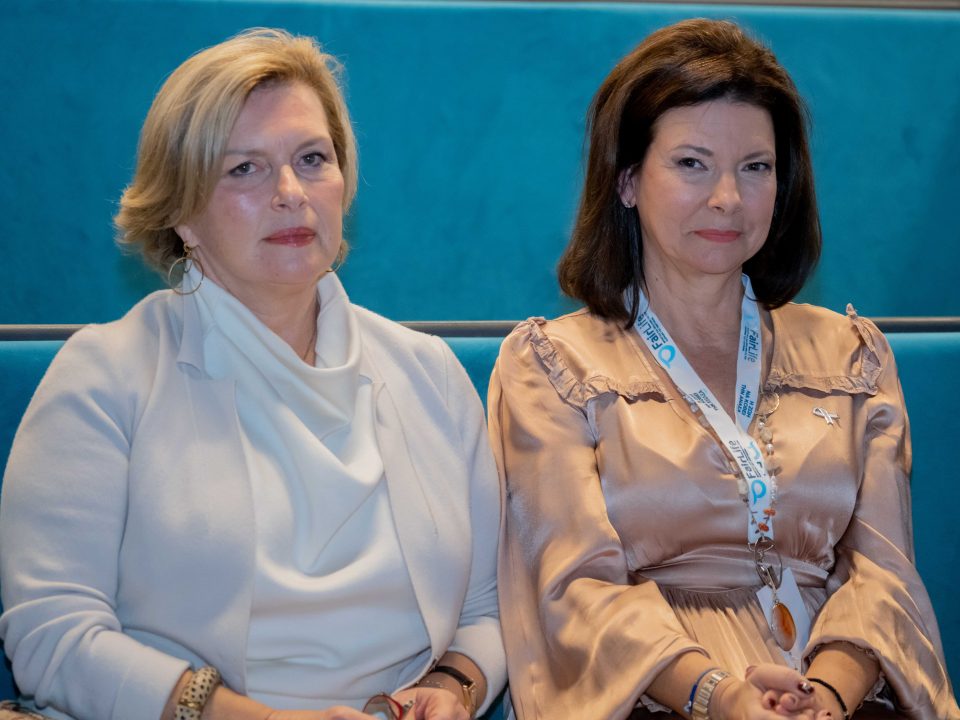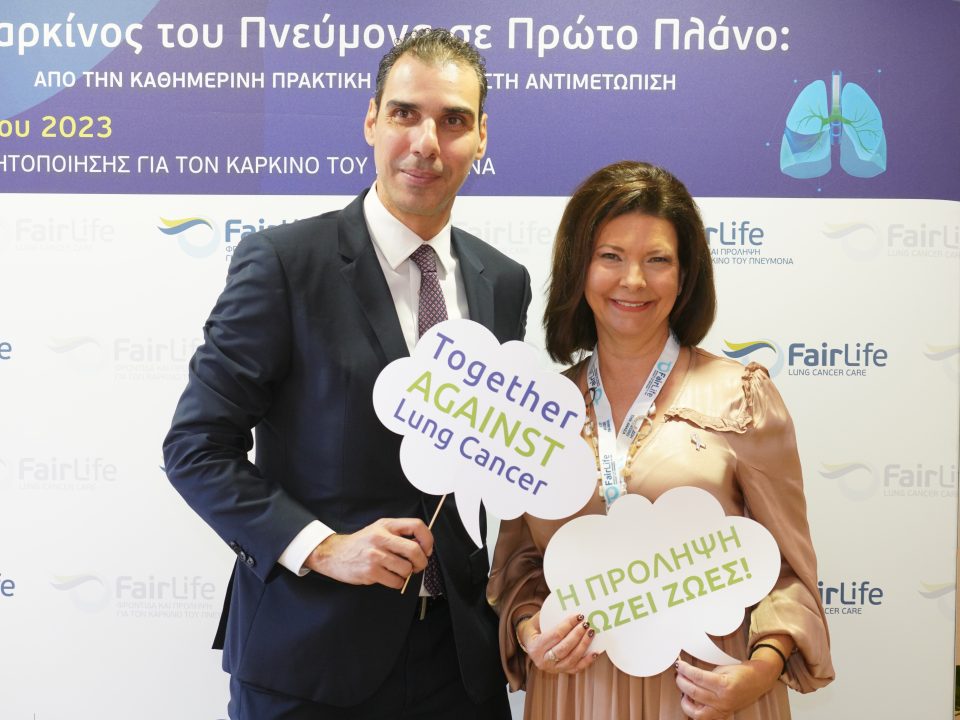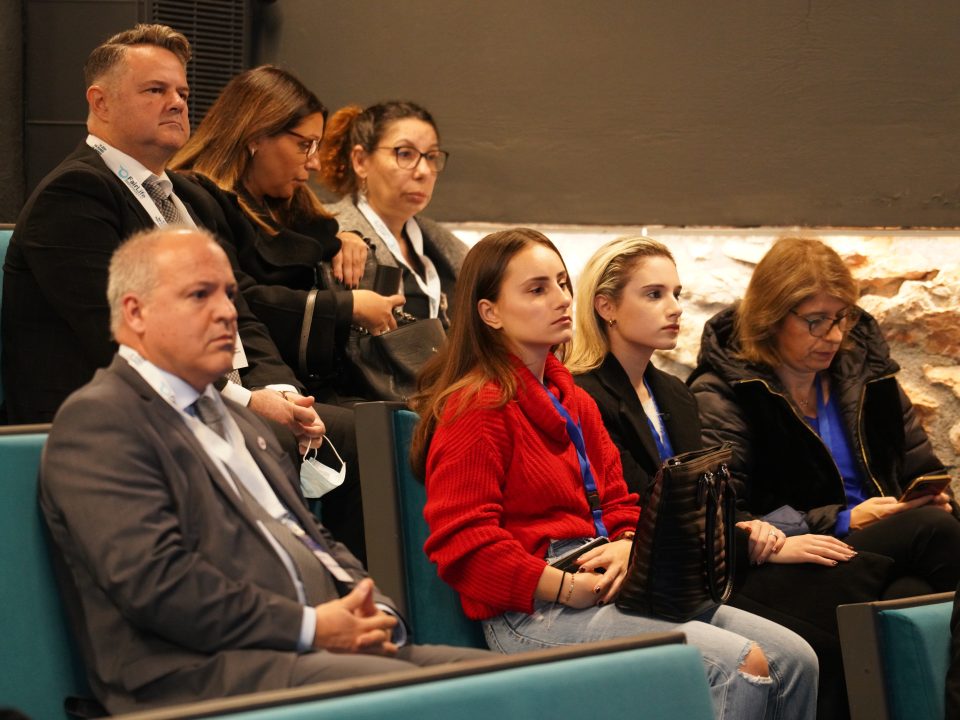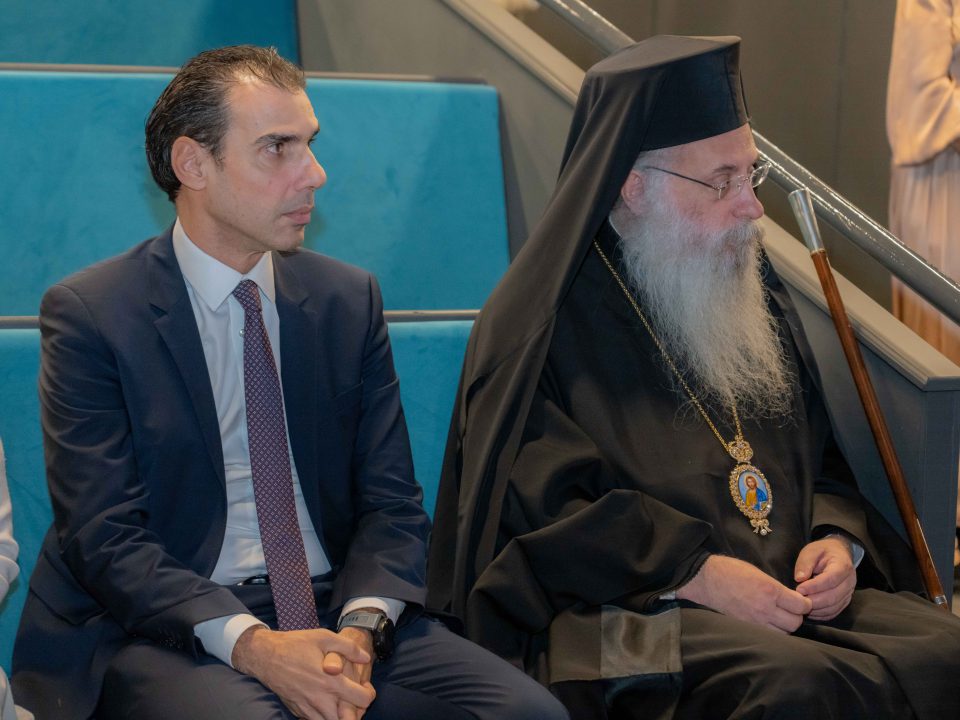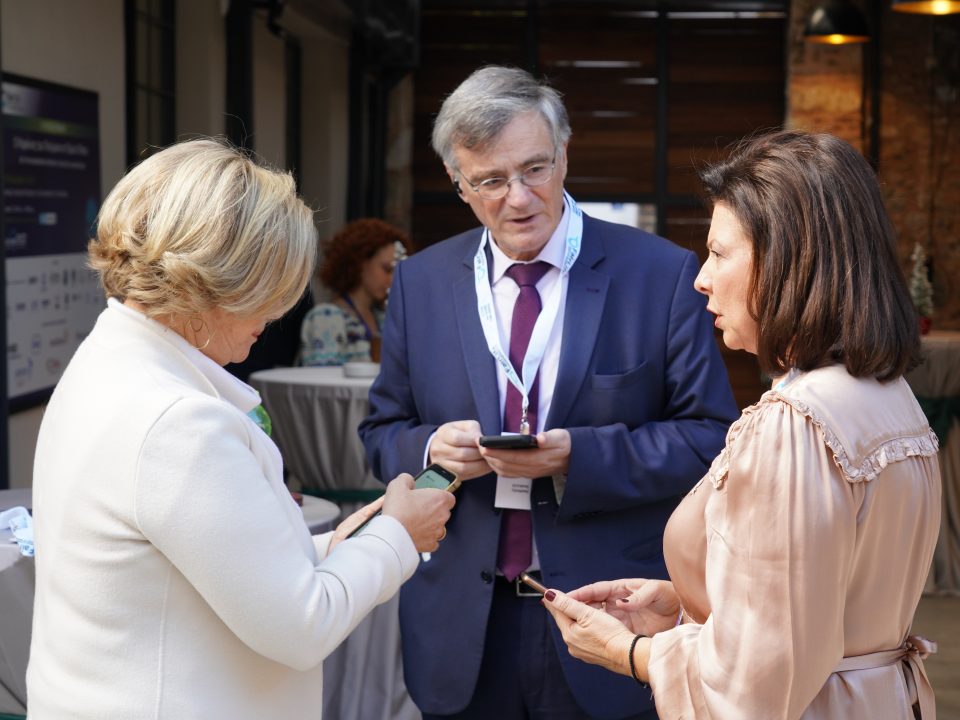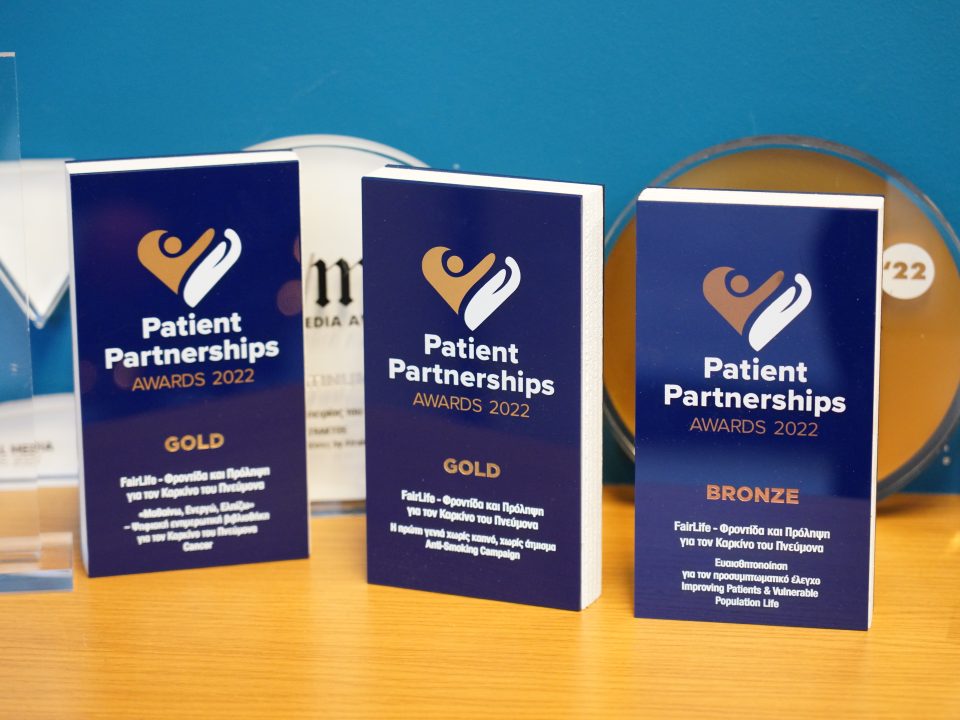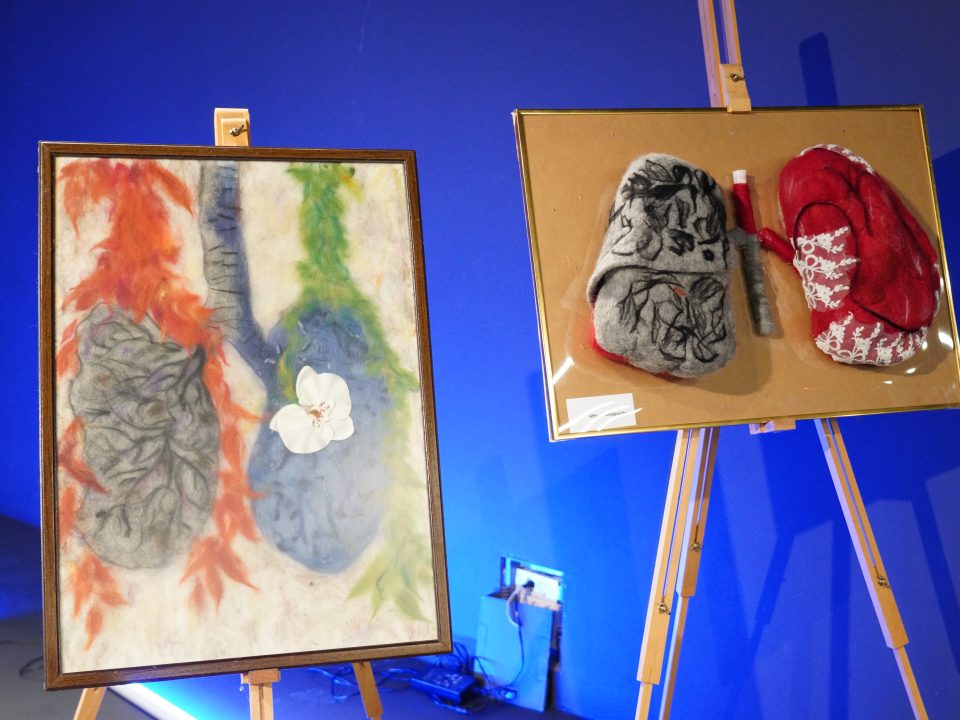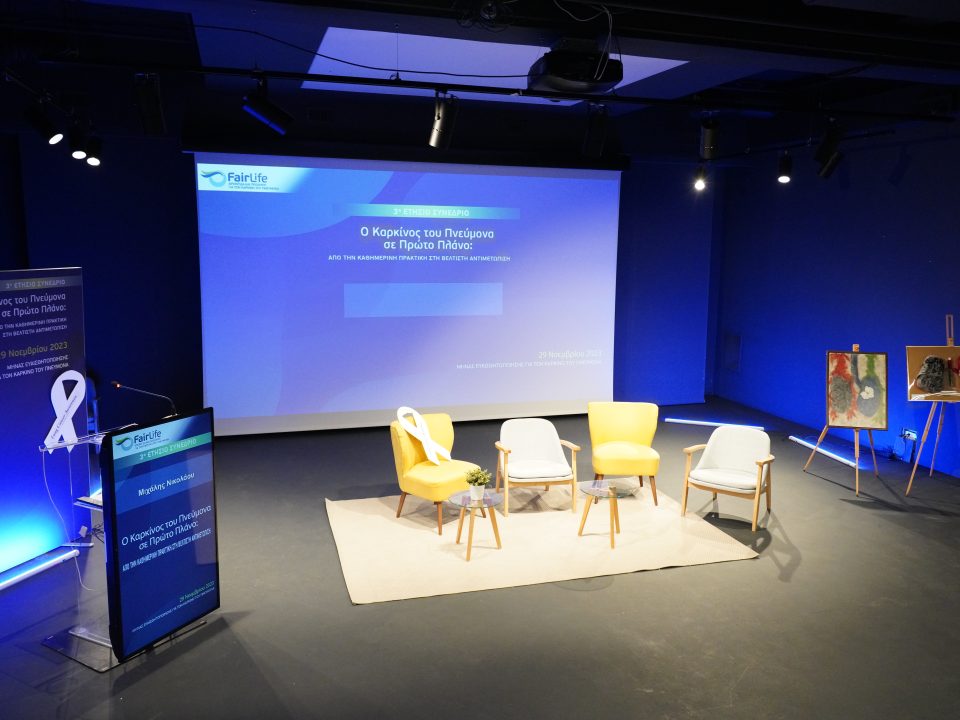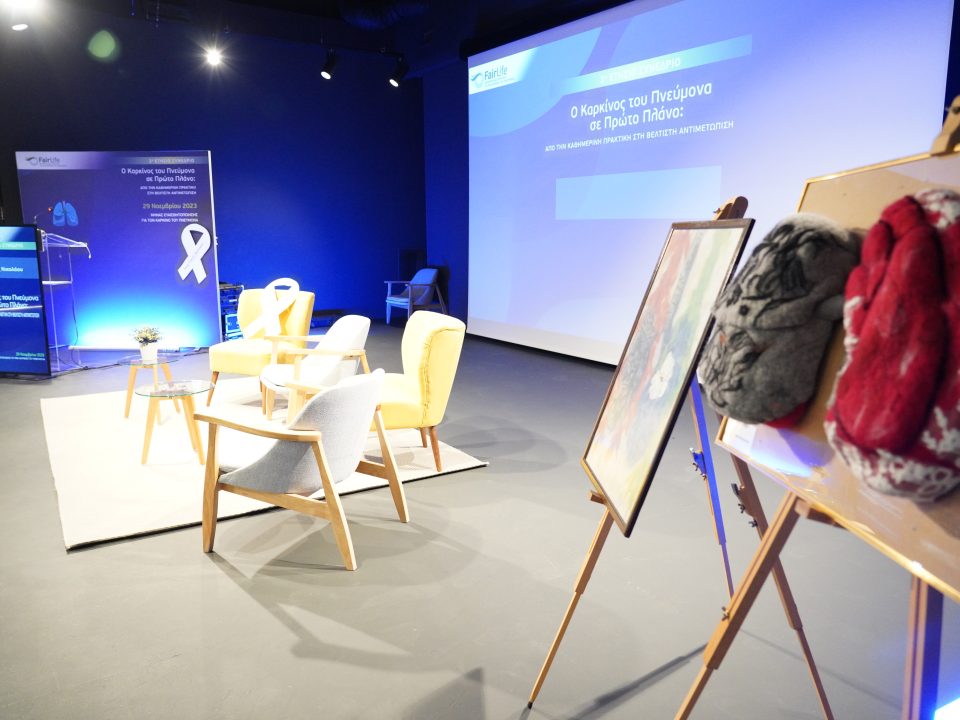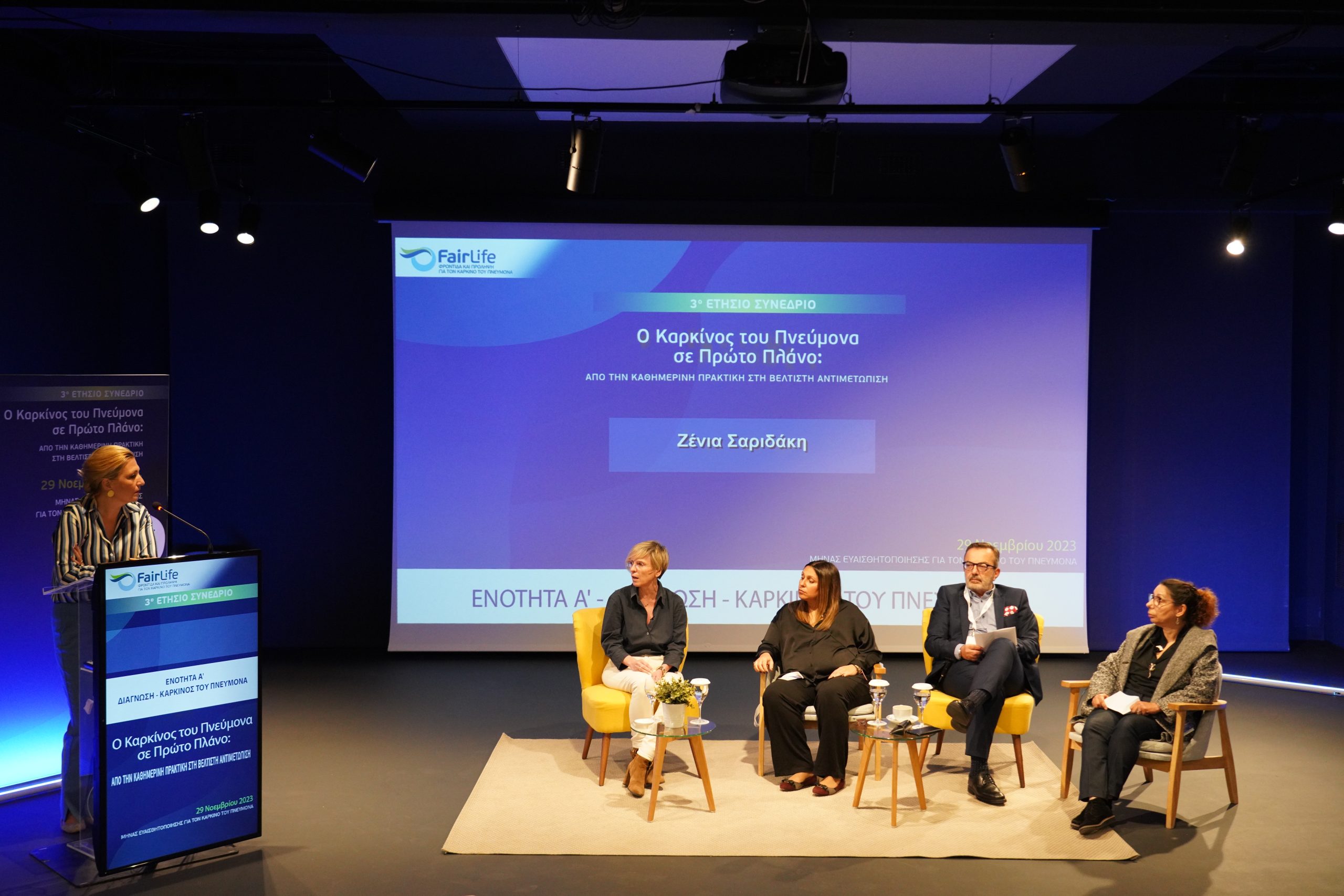
«Lung cancer awareness and prevention – the key to save countless lives in Greece»
53 speakers and commentators from Greece and abroad (representatives of the Greek and international scientific, academic and research community, the Hellenic Church and the Greek State, patients and pharmaceutical industry) discussed the importance of prevention and early diagnosis of lung cancer, the process of diagnosis in early and metastatic disease, supportive therapies and lung cancer stigma, during the 3rd annual FairLife Lung Cancer Care Conference, entitled: “Lung cancer in the spotlight- everyday practice to optimal treatment”.
The conference, hosted on Wednesday, November 29, at the ATRAKTOS venue was attended by 3,140 online and in-person viewers, and concluded FairLife L.C.C.’s activities for November, Lung Cancer Awareness Month.
The event was presented by journalist Mrs. Elena Papadimitriou.
The conference area was decorated by FairLife L.C.C.’s “Tree of Life“ – created by Mr. Manos Patestos – , where guests could write their personal wishes of optimism and hope for people living with lung cancer.
Screening
One of the main topics discussed throughout the conference was the role of the state in addressing the issue of lung cancer and the need for collaboration and communication between all stakeholders. A study with guidelines for lung cancer screening and a draft standardized procedure for its implementation in Greece with specific criteria has been submitted to the Ministry of Health, the National Public Health Committee and the National Public Health Organization. The study involved 55 professionals from various fields as well as patients for the first time. To date, there is no update on the subject. The Ministry of Health expressed its support to this effort, being already engaged in the improvement of health services and patients’ access to innovative treatments. The President of the Public Health Committee referred to the necessity of screening and mentioned the recent alarming data of the World Health Organization, which indicates a significant increase in lung cancer in young women. Representatives of the scientific community underlined their commitment to support better quality health services; however the health system needs to be reformed and reinforced.
Low-dose CT scan (LDCT) in high-risk individuals with a smoking history has been documented in meta-analyses and randomized controlled trials and represents an internationally recognized practice. Evidence from other countries shows that vulnerable groups, e.g. substance users, mentally disabled people, people from low social backgrounds do not participate in free screening programs. Therefore, special care is needed to ensure that these groups have access to prevention programs (the use of portable CT scanner units in the UK to approach people for screening was mentioned as an example).
Smoking cessation
Concern about the rising shift of adolescents to smoking alternatives was emphasized by speakers, while the partial implementation of the anti-smoking law was described as worrying. The necessity of smoking cessation campaigns, a culture of healthier lifestyles and support throughout the smoking cessation process has been identified.
Biomarker testing, innovative therapies and techniques in lung cancer treatment
The issue of specialized information for health professionals on lung cancer symptoms was discussed, as in many cases there is a delay in diagnosis to the disadvantage of patients’ course of treatment. Delays to final diagnosis are also due to delays in the process of biological sample analysis. It is therefore recommended to perform all tests in a specialized centre with the least possible inconvenience to patients.
“Rigidities” in the insurance system regarding reimbursement of biomarker testing was one of the topics discussed during the conference. Biomarker testing is essential for lung cancer patients, as biomarkers determine the individualized treatment they need to receive. This gap is being addressed by a campaign implemented by the Hellenic Society of Medical Oncologists, supported by the pharmaceutical industry, to cover with its own resources the cost of biomarker testing for patients with metastatic lung cancer.
Innovative therapies and techniques currently applied in the treatment of lung cancer were briefly presented in the fields of molecular biology, immunotherapy, pathological anatomy, radiology/radiotherapy, thoracic surgery, supported by artificial intelligence. New promising therapies will soon receive approval or are still in clinical trials, and these therapies combined with the implementation of screening, will turn lung cancer into a curable disease.
Multidisciplinary Oncology Board – Patient monitoring – Psychosocial support
The necessity of an oncology board to monitor patients was highlighted throughout the conference. This board should involve various disciplines, including social workers, psychologists, psycho-oncologists, nutritionists. Patients with a smoking history should receive support for smoking cessation. The value of physical exercise throughout treatment is undeniable and leads to a better quality of life and faster post- surgery recovery. Greece needs to have access to more clinical trials and patients should not be excluded from timely and equitable treatment. There should also be provision for palliative care and psychological support for both patients and caregivers. In Greece, there are no relative programs and patients and families suffer under a financial and emotional burden. FairLife L.C.C. has implemented the free Psychosocial Support Program BREATH. 750 individuals have referred to the program, which has benefited directly and indirectly 3400 lung cancer patients and caregivers.
The smoking stigma
A section was dedicated to the lung cancer stigma, associated with the smoking habit. The stigma evokes feelings of guilt and shame, leading to self-blame, anger, frustration and isolation. It can also delay a visit to the doctor and affect research funding. FairLife L.C.C. presented the planning and results of the campaign “Ask the right question” on lung cancer stigma as well as the important challenges to be addressed in order to relieve the burden of the disease in Greece. The international anti-stigma campaign was presented in Greece for the 1st time in Europe by FairLife L.C.C., opening the discussion and the way to change the perception around lung cancer and the lung cancer community.
Pharma representatives in accord
Representatives of the pharmaceutical industry agreed on the need for a national strategy towards an integrated approach to prevention, early diagnosis and care of lung cancer. The industry is equally focused on screening and new, rapidly available therapies through clinical trials. The need for funding is a critical part of implementing such a strategy, providing access to innovative treatments for all patients.
The conference was opened by Mrs. Korina Pateli-Bell, President of FairLife L.C.C., who emphasized the urgency of the lung cancer issue. “We lose thousands of people and this is a heavy price we unfortunately have to pay every year in Greece. All stakeholders should be on a common path, with no reservations and limits. Prevention must be a way of life for all Greek citizens, supported by scientific and multilevel information on health issues.“
Representing the Archdiocese of Athens, Epiphanius, Bishop of Talantia, noted: “Constant education of scientists and especially of physicians is an obvious requirement of our time. Cancer is a particular scientific challenge and requires early diagnosis and effective treatment. It requires public awareness, information and the right support for patients through empathy and love”.
Wishing success to the conference, Minister of Health, Mr. Michalis Chrysochoidis, noted: “The path for lung cancer patients is long and difficult. The Ministry of Health has a role to take all measures and implement the policies and strategic choices needed to address cancer. We systemically work towards this direction with commitment. Our goal is to ensure healthcare and prosperity for all our fellow citizens and open access to quality health services. Lung cancer can be beaten, thanks to the determination of each and everyone.“
Deputy Minister of Health, Mr. Marios Themistocleous, stated: “The Ministry of Health is working towards a holistic approach to lung cancer based on following key pillars: a). information b). prevention, c). better quality health services/easier access of patients to the health system and d). new treatments. Significant digital tools have been developed to facilitate the work of health professionals to improve patient management. We are focusing on more clinical trials through the clawback investment law, ensuring access to innovative therapies, as well as through the development of a digital clinical trial platform for health professionals and citizens. All of the above constitute the national cancer action plan to ensure accurate diagnosis and the provision of quality healthcare services”.
Mr. Sotiris Tsiodras, Professor of Medicine and Infectious Diseases, referred to the recent alarming WHO data, which indicates a significant increase in lung cancer in young women (35-54 years) and stressed the importance of the availability and access to clinical trials in Greece, due to which the lung cancer mortality rate has already made a difference over a period of 5 years compared to earlier rates.
The need for ongoing collaboration was stressed by Dr.Karen Kelly, CEO IASLC, who reminded the need to disseminate and apply scientific knowledge in order to reduce lung cancer mortality.
Mr. Dimitris Kontopidis, ELF President, emphasized the right to “unlimited” breath and shared his personal experience with cystic fibrosis. He referred to the role of knowledge, correct and timely information, reimbursement of innovative treatments and the self-involvement of patients in their healthcare.
Mrs. Ewelina Szmytke, Vice President of Lung Cancer Europe, expressed her support to FairLife L.C.C. and pointed out that cooperation can bring a great change for patients.
The lack of a structured screening program in Greece and the shift of young people to smoking alternatives turns lung cancer into epidemic
The opening section of the conference focused on the picture of cancer in Greece and the latest data and challenges around lung cancer early diagnosis. 3 level prevention and motivation for smoking cessation were cited as keys to reduce mortality. Data from Greek and international pilot programs as well as the submission of the lung cancer screening guidelines (June 2023) have set the foundation for lung cancer screening inclusion in the National Prevention Plan.
Mrs. Mina Gaga, Pulmonologist, former Deputy Minister of Health, presented a brief overview of the data regarding lung cancer in Greece, including the importance of prevention on three levels. She moreover expressed her strong concern about the shift of young people to smoking alternatives and pointed out the need to implement a lung cancer screening program with specific target groups, standards, ongoing assessment and expertise. She also mentioned the need for personalized treatment and psychosocial support for all patients.
Mrs. Georgia Hardavella, Consultant, Chest Physician, spoke about the urgent need for early diagnosis of the most prevalent and fatal cancer in Greece. “For the first time in our country, 55 cancer experts have been working for 2 years with patient organizations to establish Greek guidelines for lung cancer screening and a standardized procedure for its implementation at a national level with specific criteria and framework. This is a process, supported by 3 scientific institutions and patients, for the 1st time. This has been submitted in June 2023 to the Ministry of Health and there is no news on the subject so far.”
“Lung cancer screening by using LDCT scan is now an international practice. Our aim is to protect and save lives,” stated Mr. Eleftherios Zervas, Pulmonologist.
Mr. Stelios Loukidis, Pulmonology Professor, stressed: “Αlthough screening guidelines were submitted in June to the Ministry of Health, the National Public Health Committee and the National Public Health Organization, there is still no response. It is imperative for the state to take the initiative, as we all have a duty to prevent the disease as early as possible.“
Mrs. Helena Linardou, Medical Oncologist, referred to the absence of a National Neoplasm Registry in Greece, which makes it impossible to have a clear picture of the epidemiology of cancer in the country. Mrs. Linardou highlighted the established benefits of screening based on both global and recent national studies. She referred to the “Lung Health” program implemented at the Metropolitan Hospital and supported by FairLife, stressing that a comprehensive screening program should include a general change of lifestyle and represent a culture of prevention.
“Patients who are detected early are a source of inspiration both to us and other people as well» stated Mrs. Jesme Fox, Medical Director, Roy Castle Lung Cancer Foundation, UK and Secretary, GLCC. Mrs. Fox spoke about the operation and data of the pilot lung cancer screening programs in 42 UK areas and the shift to earlier diagnostic stages of diagnosis as a result of the program.
Short terms to final diagnosis, correct evaluation of biomarkers and advanced radiology are precious to patients
Personalized innovative therapies bring hope, as long as there is equal and inclusive access. Section A speakers agreed on the importance of a multidisciplinary approach to patients throughout the lung cancer course, while diagnostic delays and the loss of valuable time around diagnosis have been cited as major challenges.
Mr. Nikolaos Tsoukalas, Medical Oncologist, highlighted the necessity of an oncology board, of adequate training on lung cancer symptoms and of short intervals between initial symptoms and final diagnosis.
Mr. Grigoris Stratakos, Professor of Respiratory Medicine and Interventional Pulmonology, explained how important time between patients’ first consultation and final diagnosis is. He referred to the importance of sufficient biopsy material and the problem of delayed diagnosis, due to delays related to sample analysis.
“Accurate tissue and molecular diagnosis as well as proper evaluation of biomarkers ensure an individualized therapeutic approach to oncology patients. We should not deprive ourselves of this ‘gift’ by following dead-end paths,” commented Mr. Ioannis Vamvakaris, Pathologist.
“Oncology promises hope in lung cancer treatment. Advances such as molecular mapping of tumors, personalized new therapies, immunotherapy, are setting new perspectives. HeSMO embraces contemporary research, diagnosis, and treatment in Greece, equally and inclusively. This is demonstrated in the Lung Cancer Action Plan (2021-2026) initiative, reflecting both the oncology of the present and the future, and the belief that collective effort gives hope to people impacted by lung cancer”, underlined Mrs. Zenia Saridaki, Medical Oncologist.
Mrs. Kyriaki Tavernaraki, Radiologist, talked about radiology, which is at the forefront of lung cancer diagnosis. According to Mrs. Tavernaraki, “radiology departments should have the necessary up-to-date medical equipment to serve oncology patients during diagnosis, staging and monitoring of their disease”.
Mr. Epameinondas Kosmas, Pulmonologist, spoke about the current challenges surrounding early diagnosis of cancer. “The stakes are huge. Lung cancer can become a curable disease only through early diagnosis.”
The necessity of a multidisciplinary approach to address inequalities in access was raised by Mr. George Kapetanakis, President of the Hellenic Cancer Federation (ELLOK). “Scientists are leading and patients are joining. The state has to take the necessary steps.”
Mrs. Athina Baroufi, artist, shared her lived experience as a patient, sharing with the audience what it means to live with the fear of the disease, while stressing that every lung cancer patient deserves to be free of stigma.
Robotic thoracic surgery, radiosurgery and immunotherapy for patients with early lung cancer
Section B covered the latest thoracic surgical techniques, advanced radiotherapy and systemic therapies, regarding potentially curable lung cancer. The value of perioperative immunotherapy and patients’ referral to an oncology board for optimal treatment was highlighted.
Mr. Michalis Klimatsidas, Thoracic Surgeon, referred to the rapid development of technology both in terms of imaging techniques and thoracic surgery. Particular reference was made to robotic thoracic surgery, which is an important tool in the fight against lung cancer. It was also announced that non-surgical endobronchial ablation of small tumors is now available in Greece for patients, where surgical removal is not an option.
Mr. George Pissakas, Radiation Oncologist, spoke about the benefits of radiotherapy as a treatment option for patients diagnosed with early lung cancer, as well as the technique of stereotactic radiotherapy and the promising future solution of radiosurgery.
Mr. Petros Christopoulos, Medical Oncologist-Hematologist, referred to 2023 as a milestone year for early NSCLC. “The first approval of preoperative chemoimmunotherapy changes the therapeutic algorithm and – combined with the success of the postoperative osimertinib and alectinib trials – now requires molecular testing already from the primary diagnosis for potentially operable tumors. In addition, 4 positive phase III trials established the value of perioperative immunotherapy, whose first approval is expected in early 2024. By broadening screening, early disease will soon represent the majority of lung cancer patients and will be cured according to currently established principles. The use of new drugs will be extended in the coming years to even smaller, stage I, inoperable tumors, and to non-metastatic tumors with rarer curable mutations, beyond EGFR and ALK.
Mrs. Helena Linardou, Medical Oncologist, discussed the innovative developments in early lung cancer treatment, with targeted therapies now being applied to patients with molecular targets as preventive treatment after surgery in early stages. “Immunotherapy is now expected to significantly improve results in the surgical stages. Immunotherapy in combination with chemotherapy, when administered before surgery and as post-surgery precaution, increases survival significantly in patients with operable disease! The first step after the initial diagnosis should be patients’ referral to an oncology board before surgery to lead the best treatment strategy. This may not be surgery outright but new perioperative immunotherapy strategies.“
Mr. Kosmas Iliadis, Thoracic Surgeon, referred to the development of therapies and especially to chemo-immunotherapy, which increasingly leads to operable cancers, a very optimistic fact for the subsequent progression of the disease.
Mr. Ioannis Georgakopoulos, Assistant Prof. of Radiation Oncology, spoke about the contribution of immunotherapy, improvement of techniques and stereotaxic surgery offering new hope to patients.
Mr. Michalis Nikolaou, Medical Oncologist, stressed the importance of screening, smoking cessation programs and the existence of an oncology board as key points in the management of lung cancer.
The world of oncology is transforming. Immunotherapy and targeted therapies offer perspective to patients with metastatic disease
Sections C speakers addressed recently approved next-generation drugs and therapeutic developments for patients with metastatic lung cancer. The body’s defence system is mobilised against cancer through immunotherapy while ‘targeted’ therapies directly inhibit molecular pathways of tumour progression.
The function of immunotherapy was thoroughly analyzed by Mr. Ilias Athanasiadis, Medical Oncologist.”Immunotherapy mobilizes the body’s defense system against cancer. It has changed the natural course of lung cancer and created perspectives that we could not even imagine,” stated Mr Athanasiadis, stressing the need for infrastructure to provide patients with appropriate guidance on their treatment.
Mr. Ioannis Mountzios, Medical Oncologist, referred to progress through targeted therapy. “The revolution in molecular biology has led to the discovery of a series of mutations in the DNA of cancerous tumors for which specific molecular therapies have been developed, The so called ‘targeted’ therapies directly inhibit the molecular pathways of tumor progression. Treatment with these targeting agents, administered orally in most cases, has led to significant improvements in the overall survival and quality of life of patients.”
Mr. Petros Christopoulos, Medical Oncologist -Hematologist, referred to the latest drugs for lung cancer. These include next-generation kinase inhibitors to better address tumors with EGFR, ALK, ROS1, NTRK, RET and other oncogenic mutations, conjugated antibodies to selectively disperse toxins in neoplastic cells, multispecific antibodies that target multiple cancer antigens or activate the immune system against them, and immunotherapies against intracellular neoantigens, which will radically change the therapeutic landscape in lung cancer and oncology in general.
Ms. Androniki Pardalou, Biologist-Caregiver, reflected on her own family’s experience when her father was diagnosed in 2018 and their cancer journey began. This experience has taught her a lot about lung cancer and the pilot screening program carried out at “Sotiria” Hospital.
Improved quality of life and patients’ mental health are in the spotlight. Medical treatment and palliative care walk side by side.
Section D focused on holistic care for people living with lung cancer. Speakers agreed on the need for psychological and social support for patients and caregivers. Moderate exercise, a balanced diet and recommended vaccines contribute to positive treatment outcome.
Mr. Ioannis Boukovinas, Scientific Director, Oncology Unit, Bioclinic Thessaloniki, pointed out: “We need to truly take care of patients and we need to learn how to listen. Unfortunately, this is not taught at university, although it is highly important.” He spoke about the importance of early palliative care, of physical exercise and of the multidisciplinary team to ensure quality of life throughout lung cancer survival.
The importance of nutrition in treating and preventing sarcopenia was emphasized by Mrs. Stavroula Droufakou, Consultant Medical Oncologist, indicating exercise as one of the best daily “pills” that cancer survivors can take to maximize their lifespan.
Mrs. Vissaria Sakka, Internal Medicine and Infectious Diseases Specialist, noted: “Lung cancer patients are highly susceptible to infections, especially respiratory infections, as they have significant immunosuppression caused by the disease alone and the toxicity of chemotherapy and radiotherapy. Efficacy and safety of most vaccines in lung cancer patients are as high as in the wider population.”
Commenting on the challenges faced by people living with lung cancer, Mr. Paris Kosmidis, Medical Oncologist, noted: “Lung cancer is one of those cancers with a multi-level impact on people. Support should include social, psychological and civic support. Lung cancer patients will feel more comfortable and optimistic throughout the journey.”
Mr. Dimitrios Papageorgiou, Assistant Professor of Pathol. Nursing underlined: “Lung cancer is a serious disease which affects both patients and families. Over the next years, we will aim to build and train lung cancer specialist nursing personnel, to provide personalized intervention and holistic care for patients with lung cancer.”
Mrs. Zoe Grammatoglou, President of the KEFI Association, referred to the gap in palliative care in Greece: “Treatment and palliative care walk side by side. The necessary steps have unfortunately not yet been taken. Progress has been made for lung cancer, however screening should also reach groups with no access, such as mentally ill patients.”
“Wellness has proven to be an important means of preventing and maintaining good health,” emphasized Mrs. Kiki Tsakaldimi, Board Member and Ambassador of FairLife L.C.C.
There is always a person and a family behind every disease. With empathy and understanding we can erase the stigma of lung cancer.
Lung cancer stigma is deeply rooted within the Greek society. People believe that cancer is definitely the sole responsibility of patients, due to the smoking habit. Its impact has many implications and requires awareness-raising actions and targeted interventions. FairLife L.C.C.’s campaign opens the discussion, by giving voice to real people who have experienced the lung cancer stigma
FairLife L.C.C. ‘s “Ask the Right Question” campaign is special and the impact of the smoking stigma is huge, noted Mrs. Angeliki Souri, Patient Advocate, Board Member of FairLife L.C.C.
Mrs. Thomais Sarakinioti, Project Manager, FairLife LCC, spoke about the planning of the campaign and the remarkable online interest expressed in terms of recorded numbers related to the campaign.
According to Mr. Ioannis Boukovinas, Scientific Director, Oncology Unit, Bioclinic Thessaloniki, lung cancer does not discriminate gender, habits and age. In addition to understanding the disease and its holistic treatment, doctors should demonstrate empathy to eliminate stigma.
“The lung cancer stigma is real and although we have made significant progress in terms of cancer treatment, progress has not been similar in fighting stigma”, stated Mrs Dimitra Kanaloupitis, Medical Oncologist, who referred to the interventions that can reduce stigma, as presented at the World Conference on Lung Cancer.
Mr Athanasios Vozikis, Professor, Department of Economics, University of Piraeus, noted: “The stigma of lung cancer feeds the perception that lung cancer is definitely the sole responsibility of patients due to the smoking habit. This creates an extra burden and negative psychology, as patients feel they do not deserve care and compassion. FairLife L.C.C.’s Report-Action Plan “Ask the Right Question about Lung Cancer” refers to the Greek society and stigma and brings the issue to light.”
Mrs. Paraskevi Katsaounou, Assistant Professor of Respiratory Medicine, spoke about the direct association of tobacco product use with lung cancer and the immediate benefits of smoking cessation for both healthy people and patients. “80-90% of lung cancers are directly related to tobacco use. Approximately 40% of smokers diagnosed with lung cancer are still smoking at the time of diagnosis. In addition, some former smokers relapse and smoke under the stress of the diagnosis.”
The crucial role of initiatives addressing the lung cancer stigma was highlighted by Mr. Caius Kim, Global Director, AstraZeneca, LAA, who expressed his belief that new technologies, and advances in radiological diagnostics will improve outcomes for people living with lung cancer.
Representatives of the pharmaceutical industry, Mrs. Evi Dalakaki, MSD Greece, Mr. Thanasis Akalestos, Roche Diagnostics (Hellas), Mr. Aristidis Nikolaou, AstraZeneca, Mr. Giorgos Tsakalakis, BMS Greece, Mrs. Emilia Kassotaki, Janssen and Mr. Andreas Roussidis, GSK, agreed on the need for a national strategy towards an integrated approach to prevention, early diagnosis and care of lung cancer. The industry is equally focused on screening and new, rapidly available therapies through clinical trials. The need for funding is a critical part of implementing such a strategy, providing access to innovative treatments for all patients.
The conference was under the auspices of: the Holy Archdiocese of Αthens, Hellenic Society of Medical Oncology (HeSMO), Hellenic Thoracic Society (HTS), Hellenic Association of Lung Cancer (HeALC), Hellenic Society of Thoracic and Cardiovascular Surgeons (HCTSS), Hellenic Society of Radiation Oncology (HESRO), ) Hellenic Radiological Society (HELRAD.), Hellenic Society of Pathological Anatomy (H.E.P.A.), Hellenic Foundation for Cancer Research (H.F.C.R.), Hellenic Nurses’ Association (HNA), Hellenic Psychological Society (HPS). And of the European and international bodies, Global Lung Cancer Coalition (GLCC), International Association for the Study of Lung Cancer (IASLC), Lung Cancer Europe (LuCE), Lung Cancer Awareness Month Coalition (LCAM), European Lung Foundation (ELF), and the Hellenic Association of Pharmaceutical Companies (S.F.Ε.Ε) and PhRMA Innovation Forum (PIF).
The conference was kindly supported by: MSD, Roche Hellas, AstraZeneca Greece, BMS Greece, Janssen-Cilag, PharmaServe-Lilly S.A.C.I., GSK.
FairLife L.C.C.’s mission is to holistically support people impacted by lung cancer, aiming to improve their quality of life throughout their journey from diagnosis to treatment.
FairLife L.C.C. works:
– to raise public awareness about prevention and early diagnosis, so as to reduce mortality rates
– for the right to be informed about lung cancer
– to promote equal access to diagnostic methods, clinical trials and innovative treatments
– to indicate the need for psychological support for patients, their families and caregivers
– to eliminate lung cancer stigma related to smoking.
FairLife – Lung Cancer Care was founded in memory of Simon Bell, 57, who lost the battle with lung cancer in August 2020.
Communication Manager FairLife L.C.C.:
Nelly Kapsi
Napoleontos 18, 16675 Glyfada
Tel: 213 0165784
FairLine 111 57
WEBSITE | YOUTUBE | FACEBOOK | LIKEDIN | INSTAGRAM | TWITTER
